Trinity Logistics, a leading third-party logistics provider (3PL), is thrilled to announce that President Sarah Ruffcorn has been named the recipient of the prestigious Distinguished Woman in Logistics Award (DWLA) by the Women in Trucking Association (WIT). The announcement took place during the Transportation Intermediaries Association (TIA) Conference held in Phoenix, Arizona, April 10 -13, 2024.
The DWLA is an annual award that recognizes outstanding women in various logistics fields and underscores their significant contributions to an industry traditionally dominated by men. The winner is chosen by a selection committee comprised of representatives from WIT, Truckstop, and the TIA. Sarah’s win highlights her exceptional leadership and dedication to driving positive change within the logistics sector.
“I am truly honored to receive this award,” said Ruffcorn. “This recognition is a testament to the incredible Team I am honored to work with, the influential leaders, mentors, and family that have challenged and encouraged me. This is a great reminder of the power of collaboration and empowerment to drive positive change. I hope this award inspires others to pursue their goals and aspirations!”
With over two decades of experience at Trinity Logistics, Ruffcorn’s journey exemplifies her unwavering commitment and expertise. Starting as a dispatcher in Carrier Sales, she progressed through various leadership roles before being appointed President in 2019. Her visionary leadership has been instrumental in shaping Trinity’s success while fostering a culture of innovation and excellence.
“At my very first meeting with Sarah, I knew she was a special talent,” said Catherine T. Pulos, Executive Vice President and Chief Operations Officer at Wawa, Inc. “Sarah is an expert in the field of logistics and a true servant leader. She is humble, dedicated, and truly cares about the development of her people. She believes in making a difference and her actions certainly prove that.”
This latest accolade only adds to Ruffcorn’s growing list of achievements. In September 2023, she was a recipient of the 2023 Women in Supply Chain award by Food Logistics and Supply & Demand Chain Executive. Further, her dedication extends beyond Trinity Logistics as she is actively involved in industry advocacy and empowerment initiatives. Ruffcorn serves on the TIA Board of Directors and co-chairs its Women in Logistics Committee, advocating for diversity and inclusion with the logistics landscape.
“Sarah Ruffcorn is in a leadership class that very few women will occupy and is completely deserving of this prestigious award,” said James T. Kenny, Ph.D., Professor Emeritus of Marketing. “Many organizations have sought Sarah out to serve in leadership positions or speak at their conferences because they see what I’ve seen in Sarah for over twenty years: a woman of impeccable character.”
Ruffcorn’s recognition by WIT further amplifies the impact women are having on the logistics industry. All of Trinity congratulates Ruffcorn on this esteemed honor and celebrates her continued success.
LEARN MORE ABOUT TRINITY LOGISTICSAbout Trinity Logistics
Trinity Logistics is a Burris Logistics Company, offering People-Centric Freight Solutions®. Our mission is to deliver creative logistics solutions through a mix of human ingenuity and innovative technology, enriching the lives of those we serve.
For the past 40 years, we’ve been arranging freight for businesses of all sizes in truckload, less-than-truckload (LTL), warehousing, intermodal, drayage, expedited, international, and technology solutions.
We are currently recognized on Transport Topics’ Top 100 Freight Brokerage List, as a Top 100 3PL by Inbound Logistics, and as a Top Company for Women to Work for in Transportation by Women in Trucking.
Most of us over the age of 25 can remember when the World Wide Web made its debut. We remember the “beep-boop” sound of dial-up and the big chunky computers that were as wide as a television set in the 1990’s. It’s been almost 30 years since the dawn of the Internet. It’s mystifying to look at the impact it still has on our everyday lives. Because of the Internet, e-commerce was born, and the need for flatbed shipping has increased.
The Beginning of ECommerce
Over time, ecommerce has taken the baton from traditional brick-and-mortar stores, leaving many big-box store retailers high and dry. Since Amazon Prime’s arrival in 2005, online shopping has exploded in the marketplace. The ease and convenience of it have forced many retailers to develop a strong online presence or risk closing their doors for good.
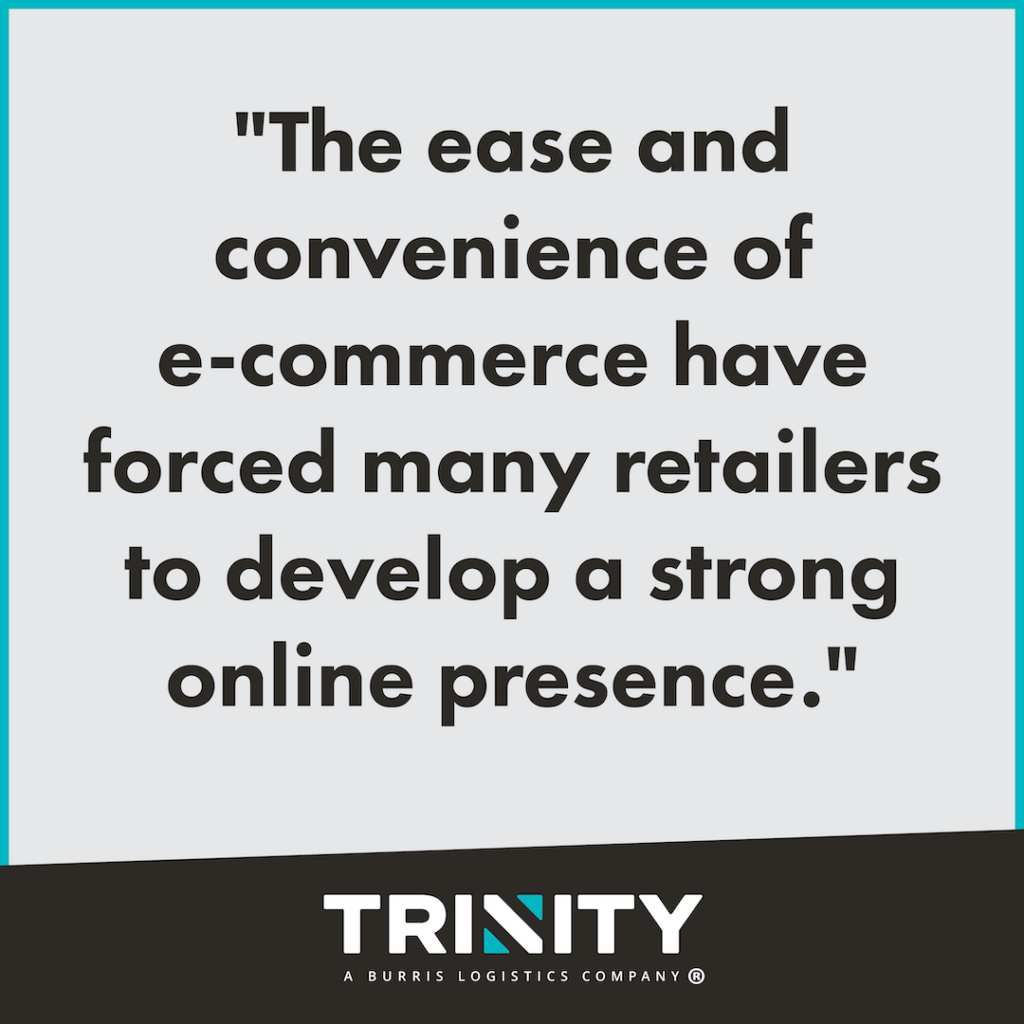
COVID-19 Creates Rapid Growth
Due to health concerns and social distancing practices, COVID-19 rapidly escalated the use of ecommerce. Total online spending in May 2020 was up 77 percent year-over-year (YOY), according to a report on online spending released in June by Adobe. In that report, Vivek Pandya, Adobe’s Digital Insights Manager, states that it would have typically taken 4-6 years to see the level of growth in online shopping that was seen then. Contactless online ordering helped individuals attempt to limit their exposure to the virus by shopping from home, so it’s easy to see why those reported numbers were so high.
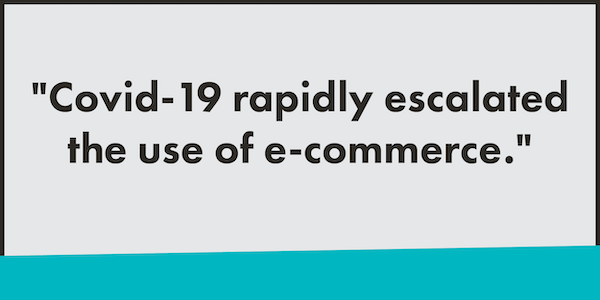
Since the pandemic, the changes in the ways consumers shop have remained. While in-person shopping has increased compared to then, it still lacks in the amount of foot traffic that was received previously. Consumers continue to like the ease of online shopping, and with fewer in-person shoppers, companies are investing less in their brick-and-mortar locations, which has only made people less likely to want to shop in person. In fact, it’s estimated that 40,000 to 50,000 retail stores will close in the next five years, according to the UBS investment bank.
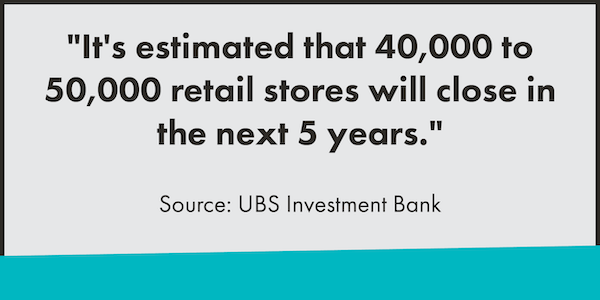
Ecommerce continues to experience growth, with 22 percent of retail sales being online in 2023, the largest U.S. ecommerce sales percentage to date, according to the U.S. Department of Commerce. As e-commerce growth carries on, it’s created a growing need for companies to expand their inventory and improve their ability to distribute their products. What used to be a problem of “too much” storage space for companies before the pandemic has quickly turned into a necessity in today’s time.
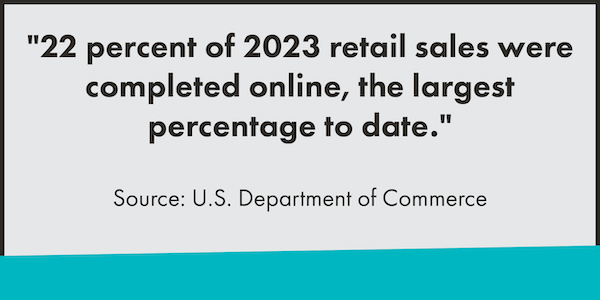
The Need for Storage Space
As online distributors continue to see growth, their need for storage space has grown as well. Prior to Covid-19, one or two warehouses could keep a medium-sized company running efficiently. Now, more space is needed to keep up with the increasing demand of companies. Having more than one distribution center can be a huge benefit to a company’s ability to stay successful these days.
This all trickles down to the construction industry. As demand grows for new or renovated warehousing, the need for building materials to meet that demand has also increased.
How ECommerce Growth Affects Flatbed Shipping
Flatbed shipping has always been a leading mode of transportation for industrial freight. Lumber, stone, racking, and other building materials travel best on an open trailer due to their odd dimensions and additional weight requirements.
Looking for an extensive guide to keep on hand for your over-dimensional shipping?
Download our FREE guide!Usually, flatbed shipping sees an increase in volume in the summer months. Construction companies take advantage of the warmer weather, which is most suitable for outdoor construction work. During this peak shipping flatbed season, it’s not unusual to see tightened capacity and higher freight rates, but any added demand for warehousing can add to that, making securing a flatbed carrier more difficult.
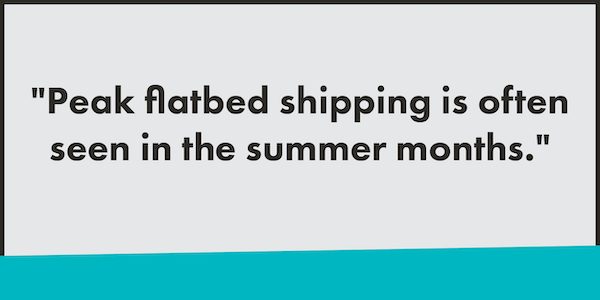
Strong Relationships Help
Having a relationship with a third-party logistics company (3PL can be a benefit to those who coordinate freight to be delivered to a job site. Typically, job site freight is very hands-on and has a perpetual knack for being time-sensitive. Installation crews are on-site to receive and install the material scheduled to be delivered. Even the slightest delay can cause significant ramifications to the completion of the construction project. Having a strong relationship with a 3PL can help companies mitigate risk, reduce costs, and provide peace of mind to those who are coordinating the freight.
Be Ready for Anything
It appears online shopping is here for the long-haul and whether it’s causing you to expand your warehousing or not a 3PL like Trinity Logistics can help you be prepared for any changes that may come your way. With Trinity, you’ll gain a Team of experts that can help you optimize your supply chain and arrange shipping for various of transportation modes, including flatbed, while offering end-to-end visibility of your shipments. No matter what changes the future brings, you can stay one step ahead when you choose to have Trinity Logistics by your side.
Stay up to date on the latest information on conditions impacting the freight market, curated by Trinity Logistics through our Freightwaves Sonar subscription.
WILL 2024 BE A FREIGHT REBOUND YEAR?
I certainly do not expect that we will return to freight volumes like we saw in 2021, and part of 2022. Now, I will never say never, but those were most likely once in a lifetime events. However, there are many signs that point to a potential for 2024 to see a rebound in freight volumes and carrier rates.
First, let’s talk about rates for over-the-road (OTR) carriers. Many new entrants came to the carrier market in ’21 and ’22, but currently, we’re seeing the contraction of for-hire carriers.
As shown in Figure 1.1, the past 14 months have seen less carriers in the market. As supply continues to dwindle, this will put upward pressure on rates. Granted, it may take another 12 months for the carrier market to find an economic balance.
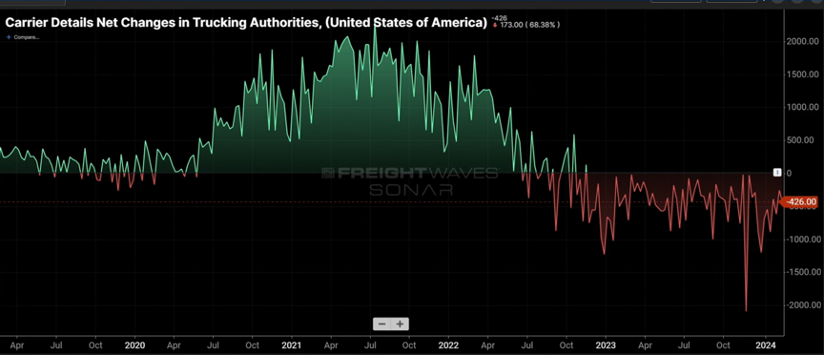
Figure 1.2 measures the rate at which carriers reject tenders (shipments) and continues to slowly climb upward. Granted, a rejection rate of five-plus percent is not earth-shattering, but in comparison to where it was in 2023, sub three percent in several months, five percent and the continuing upward movement is noticeable.
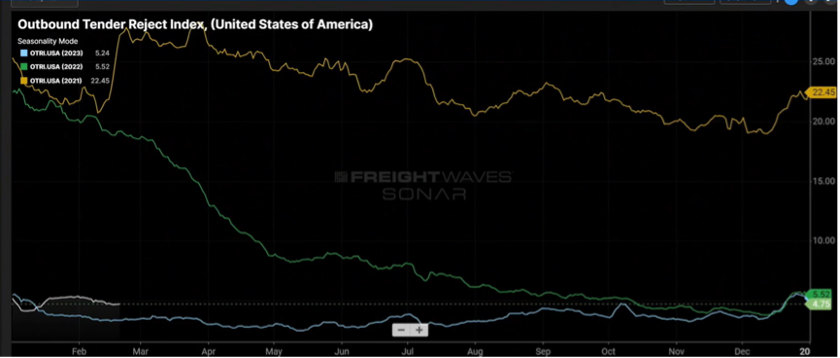
Lastly, Figure 1.3 shows that spot rates continue their slow rebound from the middle part of 2023. Contract rates throughout much of 2022 and half of 2023, were $0.60 to $0.70 cents per mile higher. Today, that gap stands at $0.36 per mile. This is a combination of spot rates inching higher, but also contract rates being less than prior years.
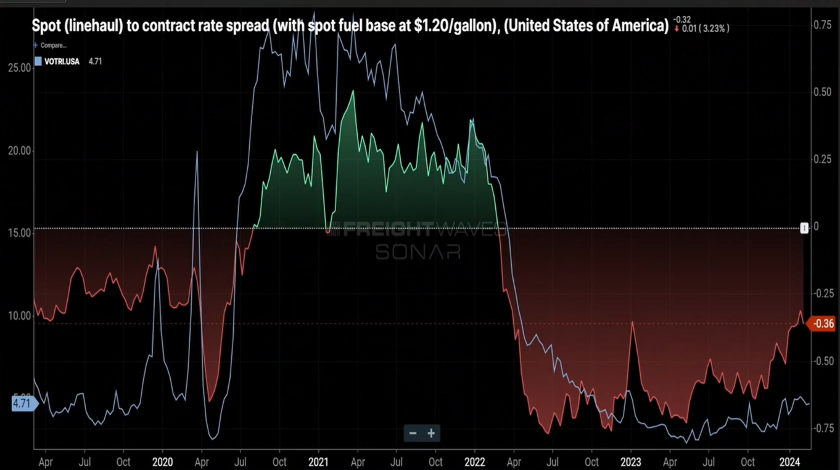
An Opportunistic Outlook
While contraction in the carrier market will influence the supply side of the economic equation, there also needs to be a demand component. The below chart (Figure 2.1) shows loaded rail car volume and over-the-road volume trending up and to the right, but the green line, representing inbound ocean containers, is really peaking.
Eventually, these containers will morph into rail and OTR volume. This is most likely a result in the drawing down of inventories, and the need for replenishment. Combine this with continuing increases in the manufacturing sector and housing market that will show better signs than 2023, it sets the stage for strong demand especially in the second half of 2024.
Will it be a bull or bear year in ’24? Well, if you would have asked that question six months ago, even maybe three months ago, my answer would have been slightly bearish or at best flat. However, seeing the recent signs on freight activity and the carriers needed to move this freight gives more reason to be optimistic as we go through the next ten months of the year.
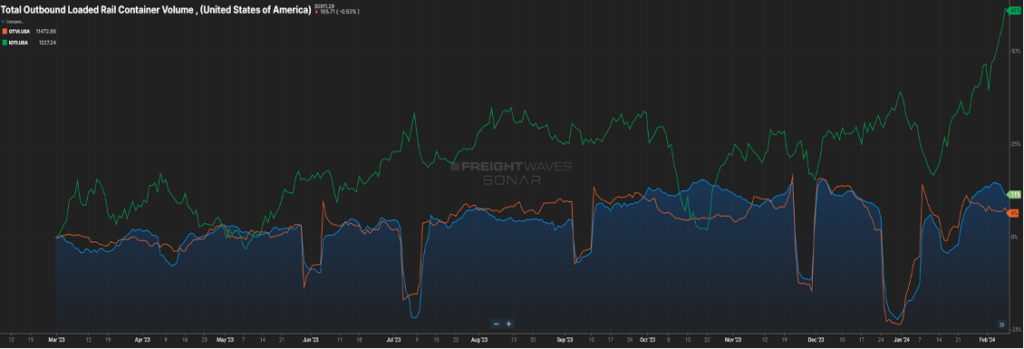
Stay Up To dAte
Looking for a more frequent update? Subscribe to our newsletter and receive the top five logistics articles of the week every Friday morning by selecting “Weekly News Update” when you select your preferences.
Get Weekly News Updates in Your InboxTrinity Logistics, a leading third-party logistics provider (3PL), is proud to announce that it has been honored with the prestigious “Fiercely Good Award” by BlueTriton Brands Inc., a prominent player in the beverage industry. The award was presented to Trinity Logistics during BlueTriton’s Annual Carrier Meeting, which saw the attendance of over 150 carrier and 3PL companies.
“The BlueTriton Brands, Inc. 2023 ‘Fiercely Good Award’ is to recognize our colleagues that embrace being fearless business owners, boldly innovative, deeply committed, and fiercely good,” said Tilde Zimmerman, Transportation Procurement Director at BlueTriton Brands, Inc. “In 2023, Trinity Logistics went above and beyond what was asked or expected of them. We like to appreciate and recognize the efforts of those who collectively make us better. Thank you for being FIERCELY GOOD, Trinity Logistics Team!”
Zimmerman specifically recognized Trinity Logistics for its exceptional commitment to service and its invaluable contribution to a community initiative spearheaded by BlueTriton Brands, Inc. Trinity Logistics played a pivotal role in facilitating the delivery of a much-needed donation of water by BlueTriton to support a local high school football showcase in Broward County, Florida, demonstrating its dedication to making a positive impact beyond the realm of logistics.
Delivering the donation posed unique challenges, including the absence of a loading dock at the school premises and the logistical intricacies of offloading the shipment directly onto the football field. Despite these obstacles, Trinity Logistics executed the task with precision and efficiency, ensuring the timely and seamless delivery of the water donation.
Representing Trinity Logistics at the event were Fatima Adams, Director of Operations at Trinity’s Florida Regional Service Center (RSC), and Jared Lineweaver, Senior Sales Executive. Their presence underscored Trinity’s commitment to fostering strong partnerships and delivering exceptional service.
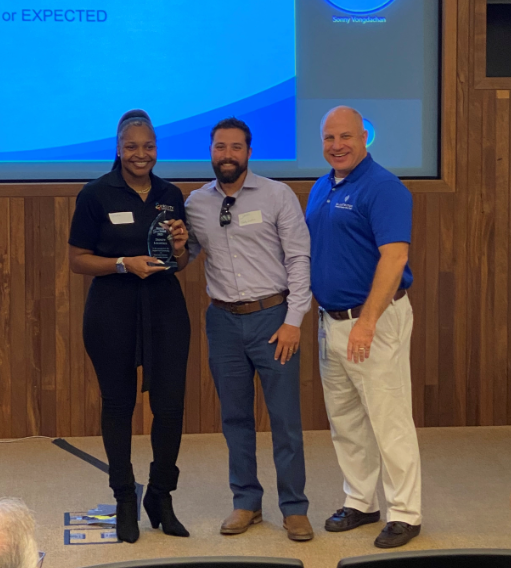
“We are deeply honored to receive the ‘Fiercely Good Award’ from BlueTriton,” said Adams. “This recognition stands as a testament to our unwavering commitment in providing exceptional service to our customer relationships. We are immensely proud of the solution our Team assembled and their dedication and resourcefulness in overcoming this challenging task.”
Trinity Logistics is grateful to BlueTriton Brands, Inc. for the recognition and remains steadfast in its mission to provide innovative logistics solutions while positively impacting the communities it serves.
LEARN MORE ABOUT TRINITY LOGISTICSAbout Trinity Logistics
Trinity Logistics is a Burris Logistics Company, offering People-Centric Freight Solutions®. Our mission is to deliver creative logistics solutions through a mix of human ingenuity and innovative technology, enriching the lives of those we serve.
For the past 40 years, we’ve been arranging freight for businesses of all sizes in truckload, less-than-truckload (LTL), warehousing, intermodal, drayage, expedited, international, and technology solutions.
We are currently recognized on Transport Topics’ Top 100 Freight Brokerage List, as a Top 100 3PL by Inbound Logistics, and as a Top Company for Women to Work for in Transportation by Women in Trucking.
After several record setting years, 2023 saw shifts to the freight market. How did the 2023 freight market affect shipper and carrier businesses? Did other businesses have the same struggles as yours? Are they expecting to face similar difficulties in 2024? How are their partner relationships?
Trinity Logistics wanted to get answers to these questions for you, so we asked a random sample of our shipper and carrier relationships to gauge the effect 2023 had on their business and what their expectations for 2024 in our first Freight Market Survey. Here’s what we found out:
2023 SHipper & Carrier Data: Freight Market Survey Results
Past Challenges – Same, But Different
Considering the recent turndown of demand and the freight market, it’s not a big surprise that money was the biggest issue for shippers and carriers alike. Shippers answered that transportation costs were their biggest challenge in 2023, with supply chain delays/disruption and capacity not far behind. Low rates and increasing operating costs were the main challenges facing carriers.
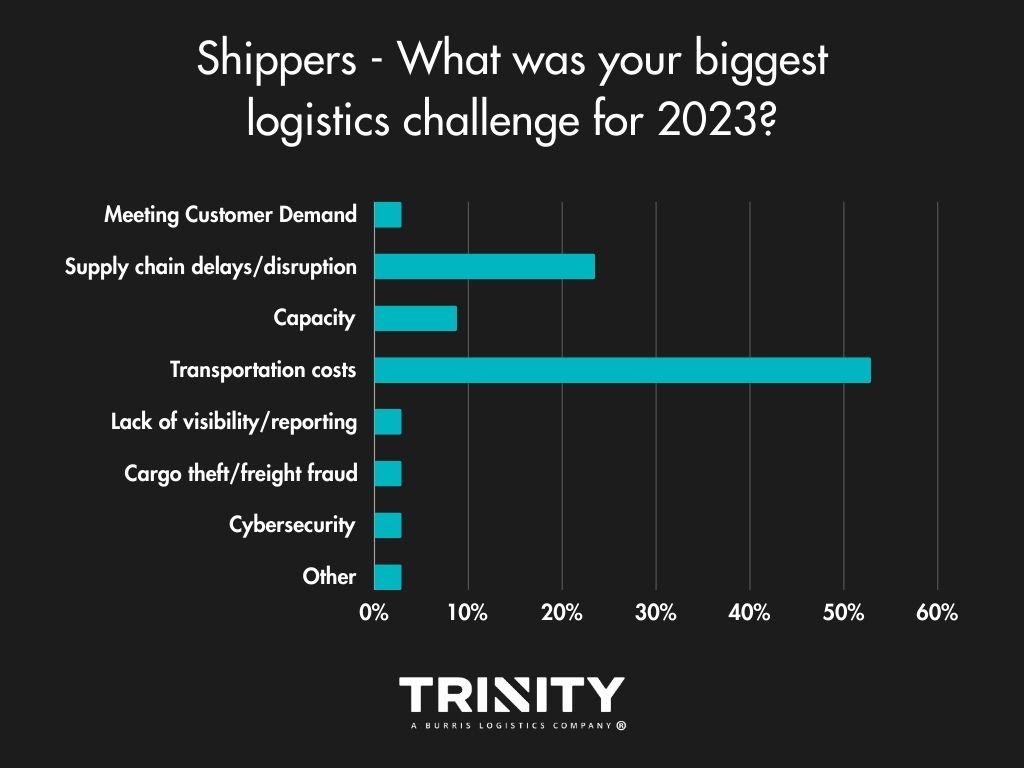
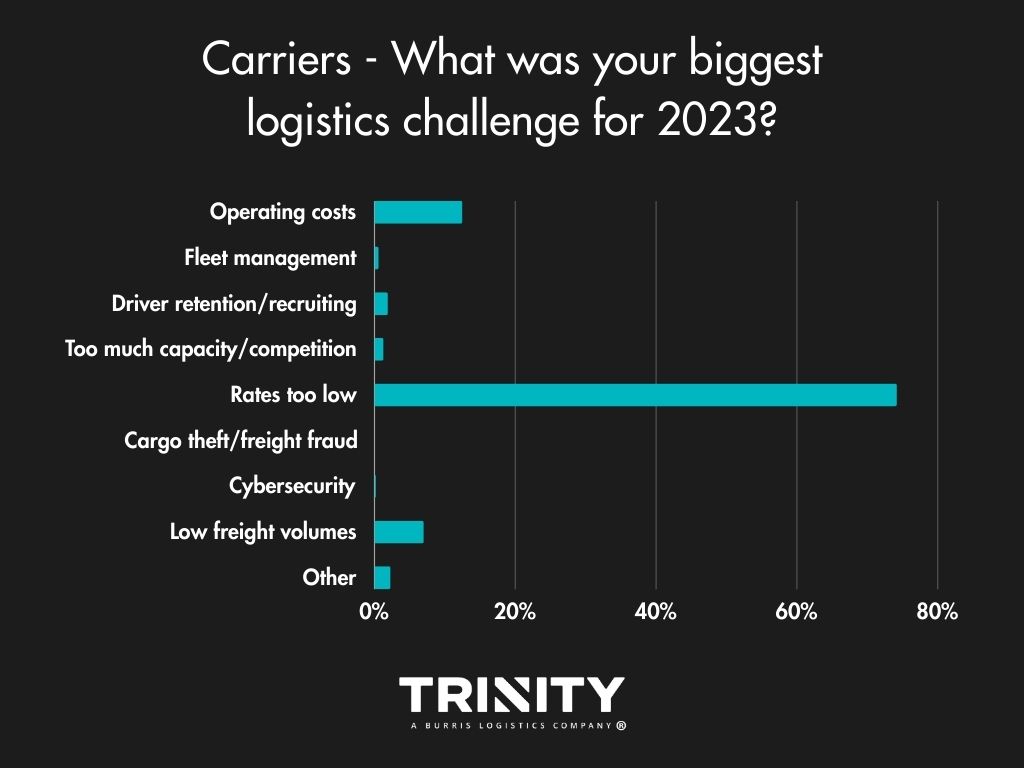
Business Impact – Could Have Been Better
Even with the change in consumer demand trending downwards throughout 2023, most shippers answered that their year was good overall. Carriers on the other hand seemed to face a rougher year in business with over half of them stating their year could have been better or was poor.
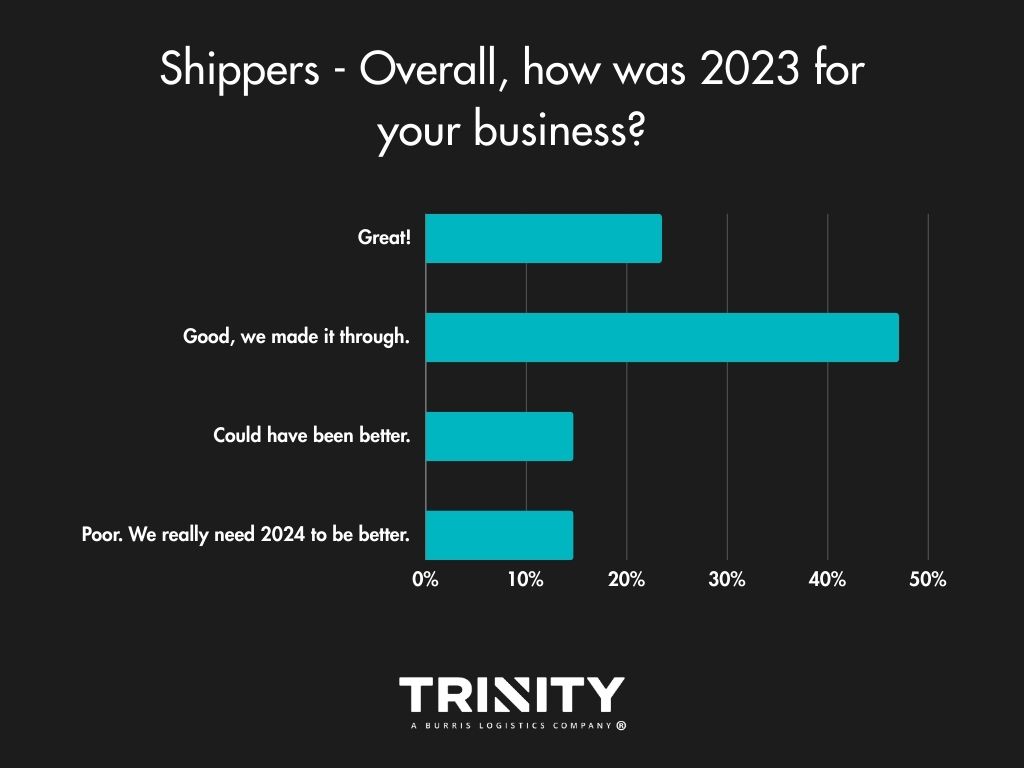
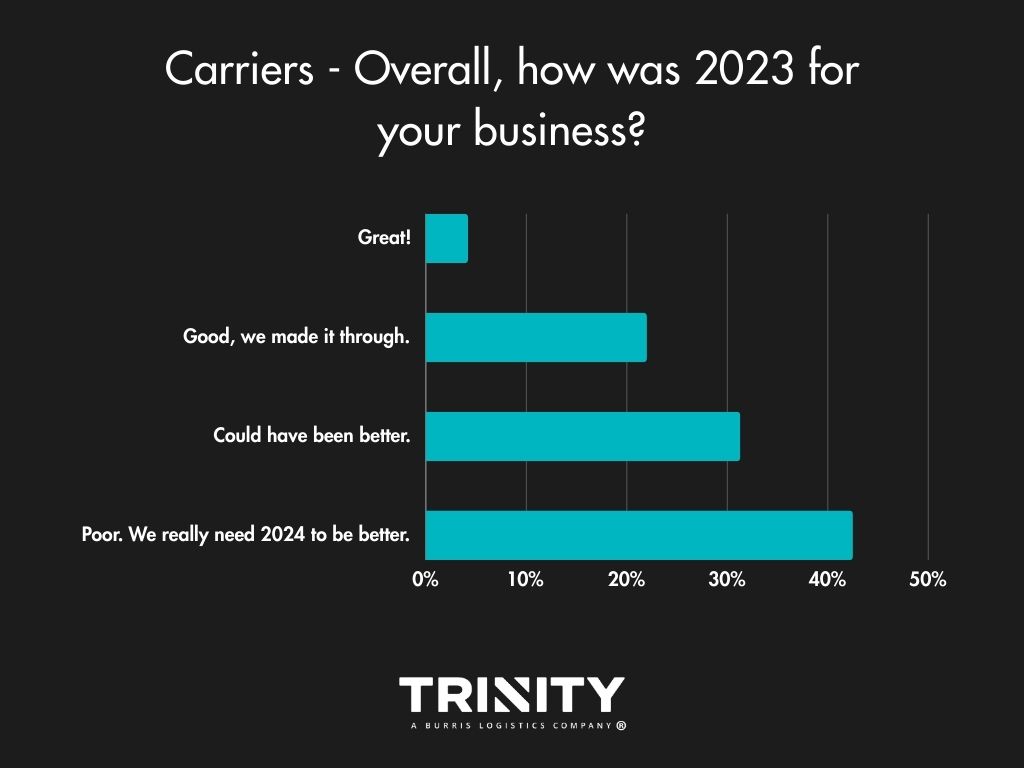
A LOOK INTO 2024
Future Challenges – Money Problems
2024 isn’t looking much different in terms of challenges compared to 2023. Shippers look to have the same financial challenges as they did in 2023 with transportation costs, supply chain delays/disruption, and decreased demand being the top concerns selected. Carriers are still concerned about low rates, operating costs, and low freight volumes hurting their businesses.
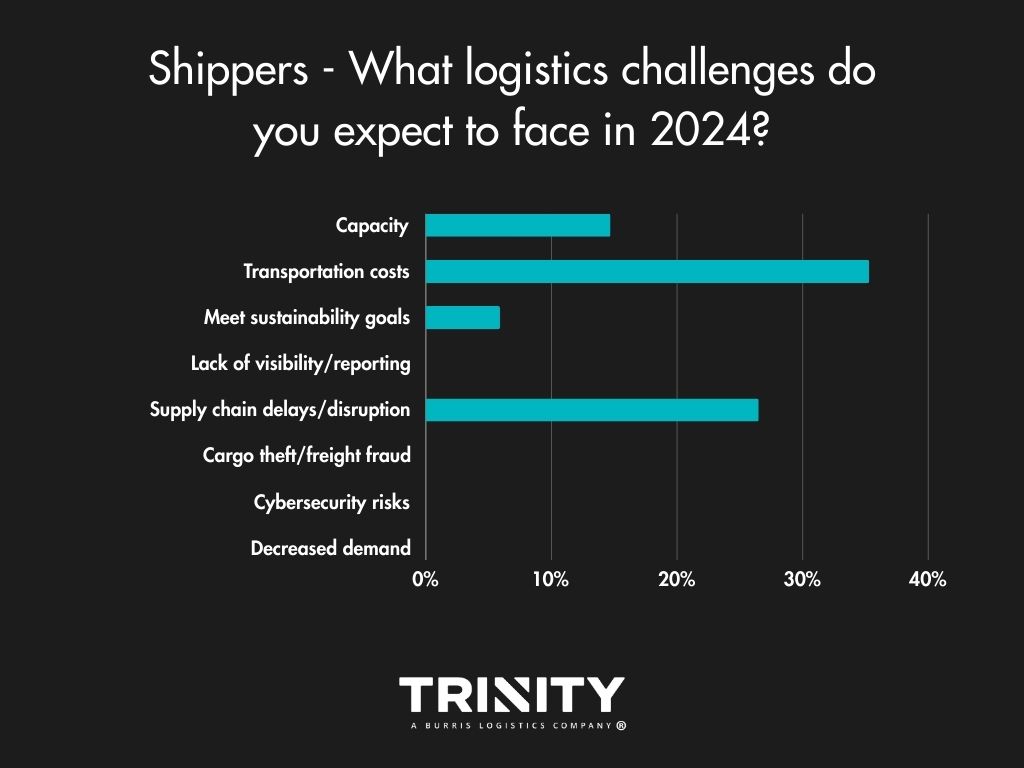
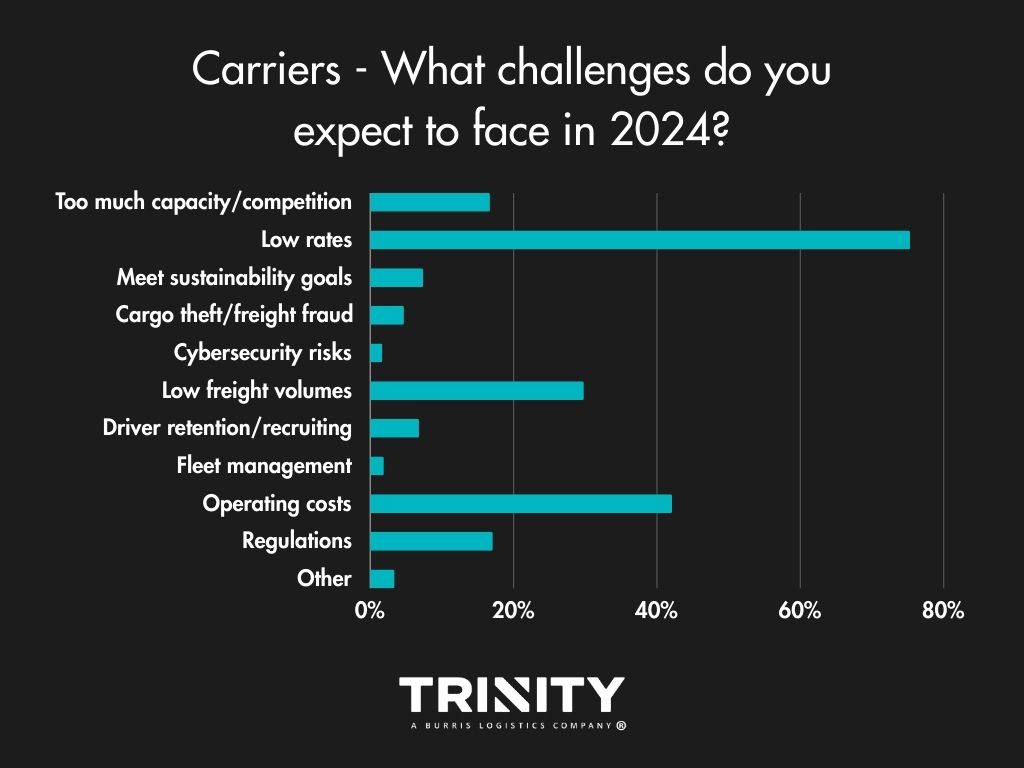
Hot Trends
Even though transportation costs are shippers’ strongest concerns in their previous answers, it seems the increased amount of supply chain disruptions and delays we’ve all experienced in these recent years have hit a nerve, with the majority answering that supply chain resilience is the trend their business is most interested in. Cybersecurity also looks to be a growing interest.
Carriers on the other hand, interestingly enough, look to the recent trend of Artificial Intelligence (AI). Also, as noted in the comment boxes of our “Other” option, increased rates and better fuel prices were trends they’d like to see in 2024.
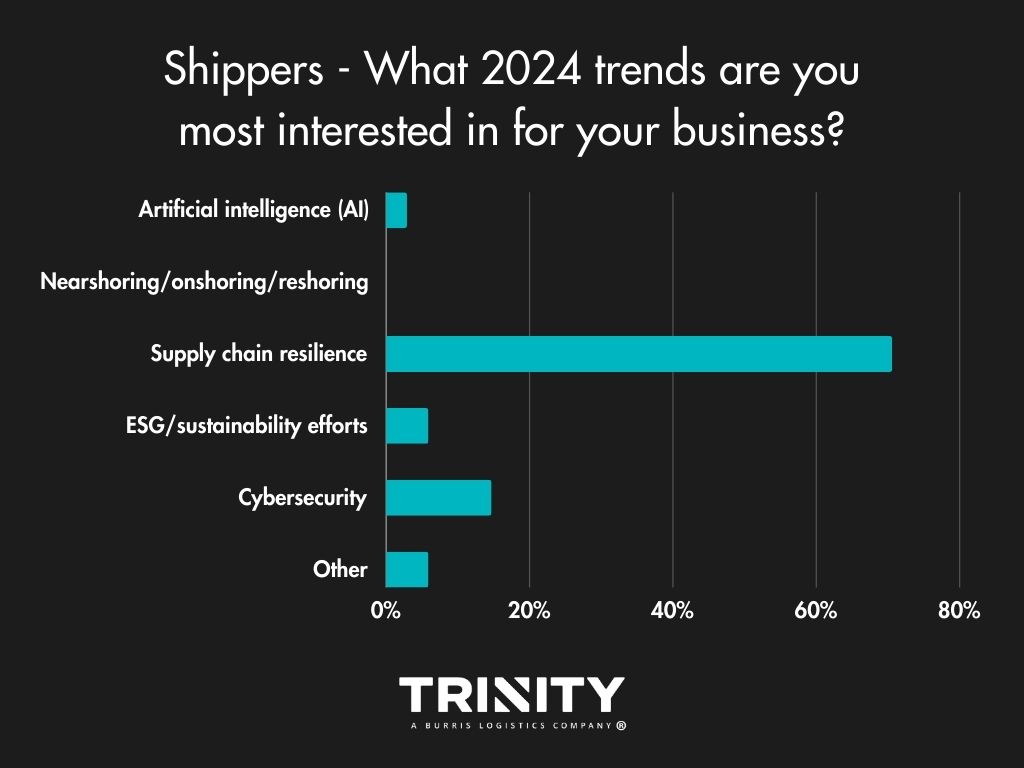
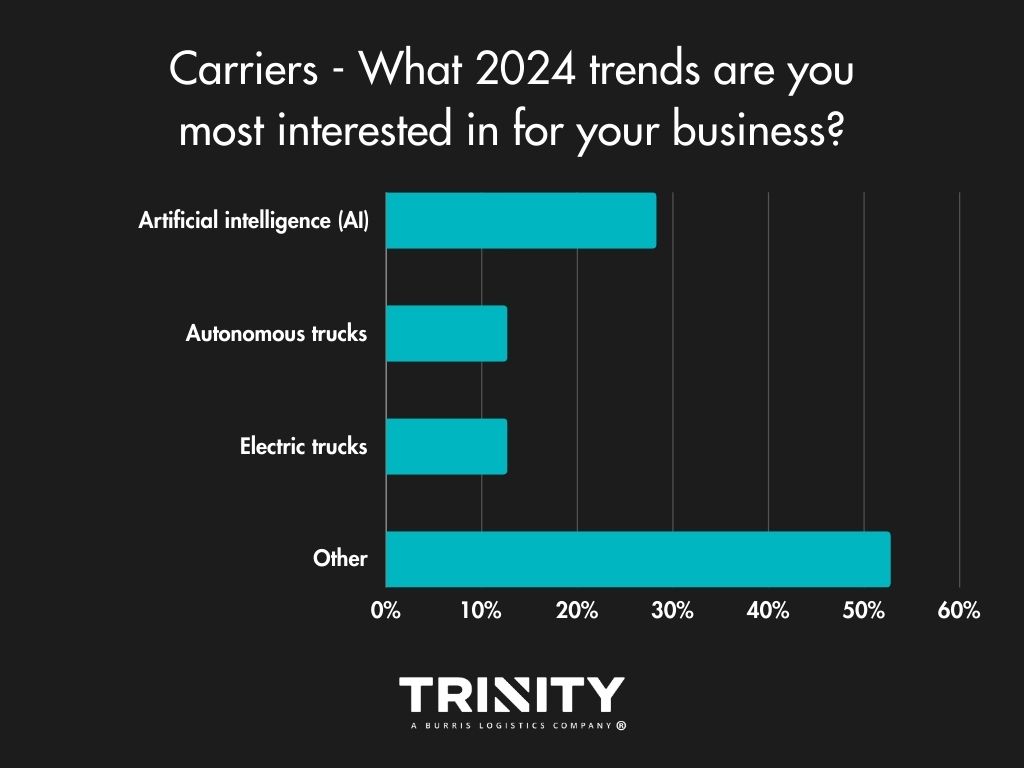
Load Volumes & Capacity – Slightly Positive Outlook
Overall, shippers are slightly more optimistic for 2024, thinking it won’t bring any change or the change it brings will be positive. Most think load volumes will stay the same or there will be a little more in freight volumes this year. As for truck capacity, they think it will be the same as 2023 or slightly tighter.
Carriers also think 2024 will bring more freight volumes and that capacity will likely stay the same or get tighten slightly versus 2023.
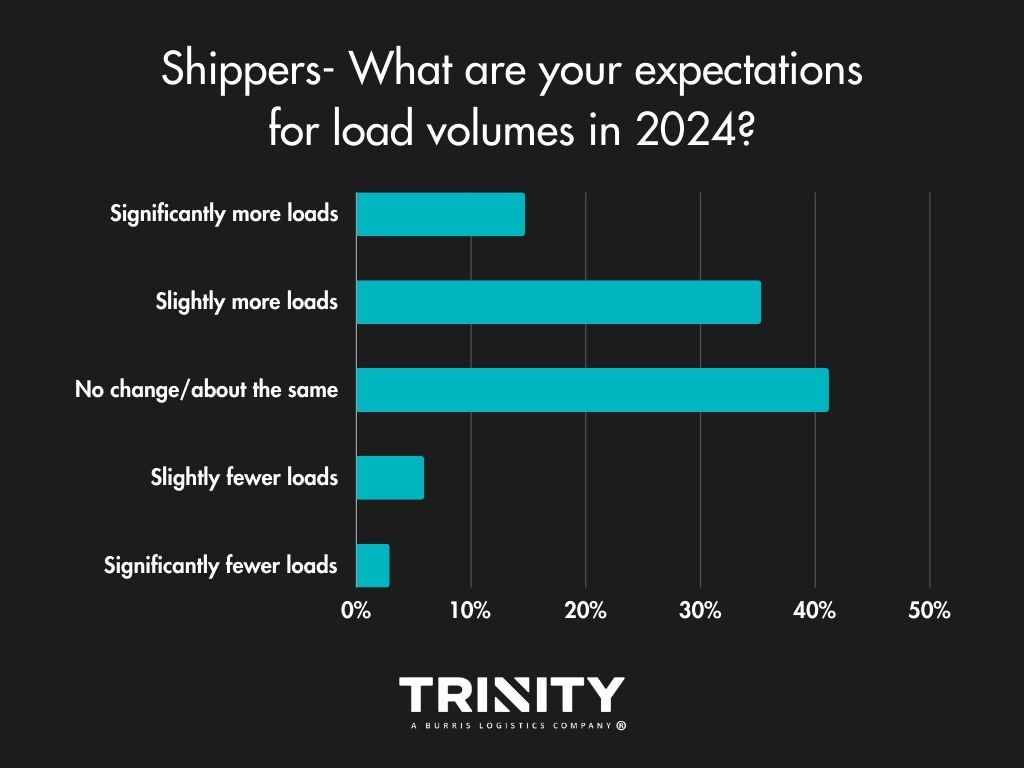
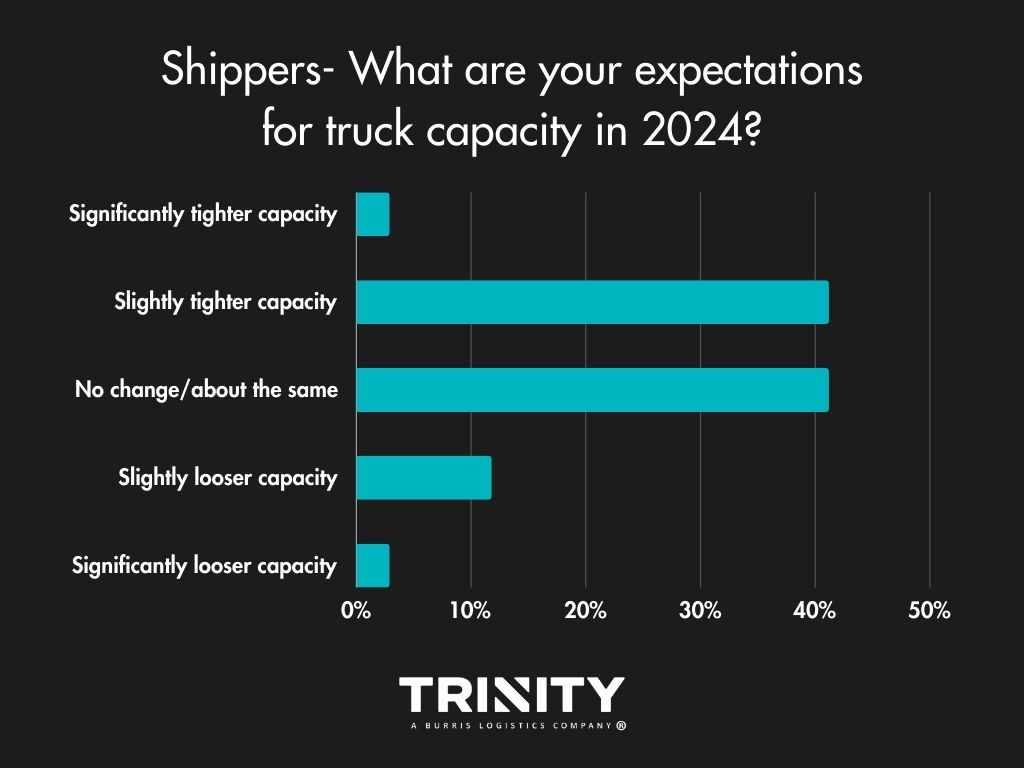
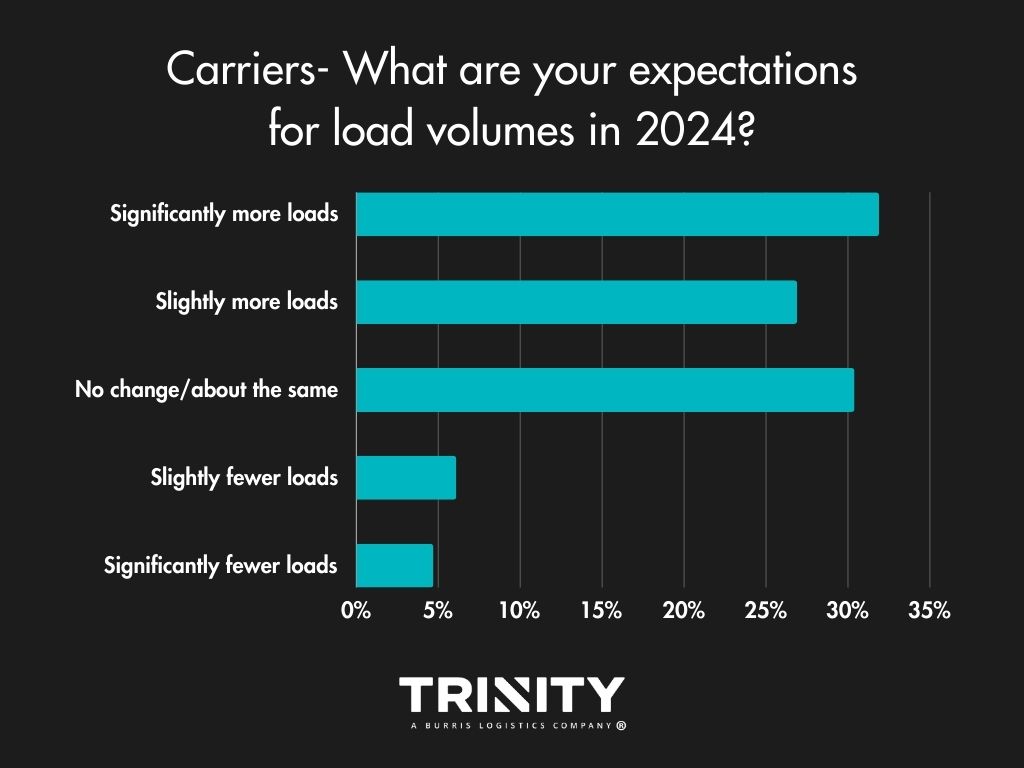
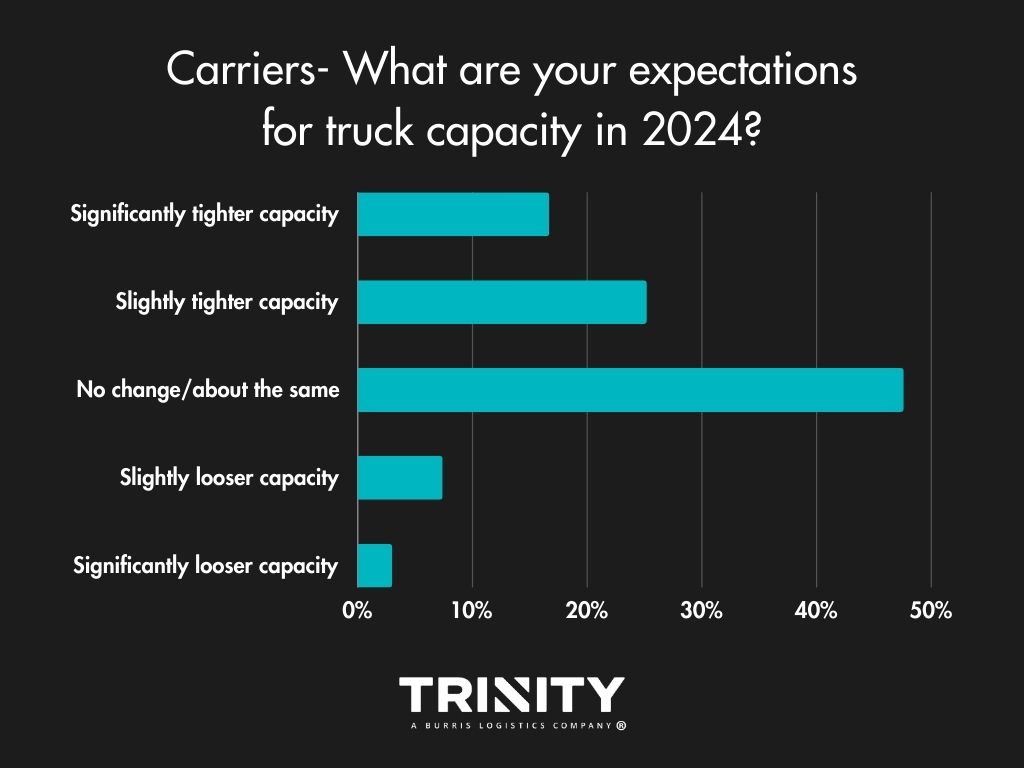
Spot or Contract?
Year-over-year, shippers aren’t looking to change much in terms of which market they turn to. Most look to continue to put most of their freight on the spot market.
For carriers, there looks to be some change anticipated. In 2023, most carriers ran spot market freight but in 2024, over half of them look to haul contracted freight.
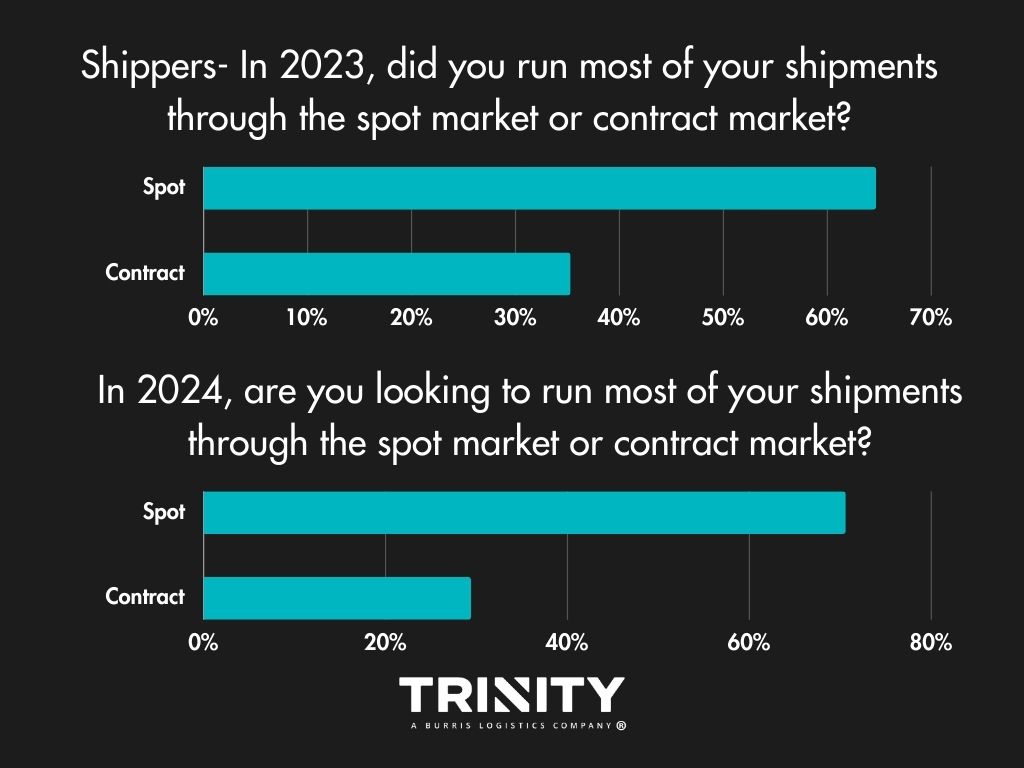
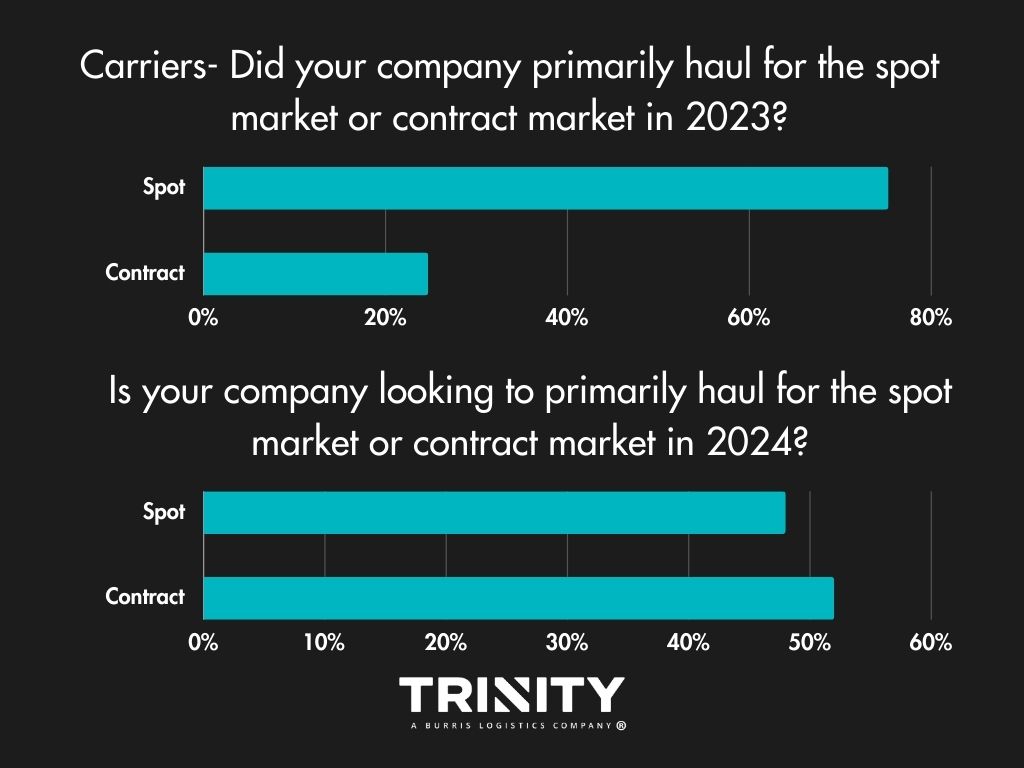
Do Shippers Have a TMS?
It’s 2024, so you’d think most shippers would have a transportation management system (TMS), and no surprise, they do. For those that don’t and answered, it seems they did not have a good experience with one in the past or don’t know enough about them.
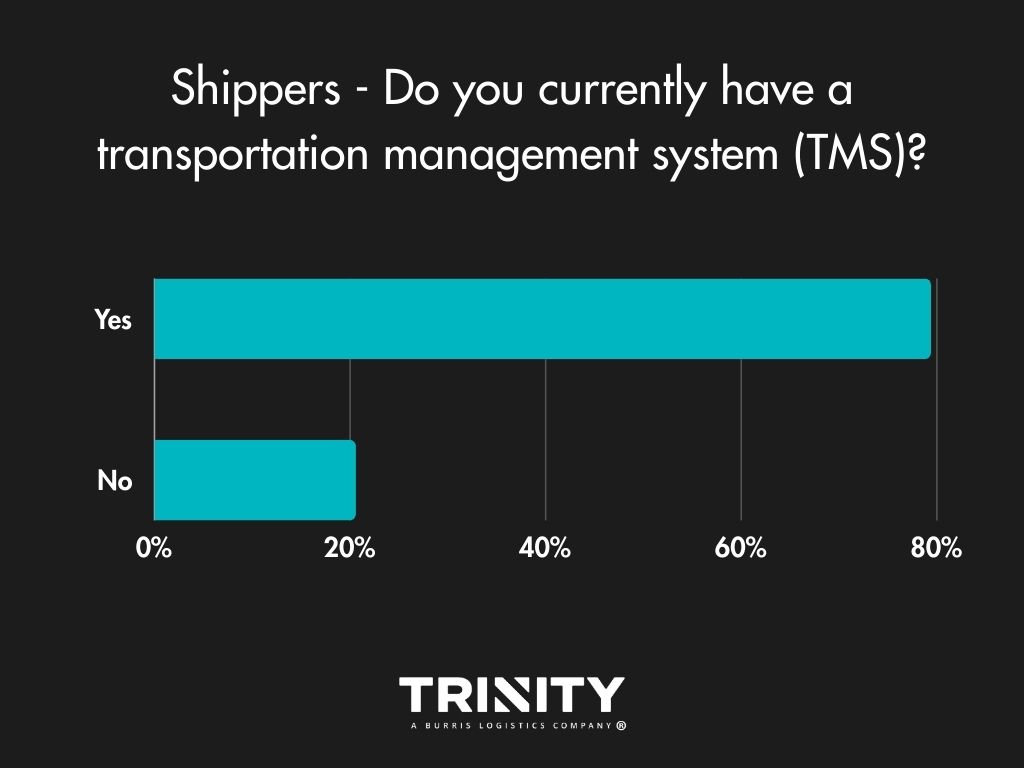
Brokers Are the Way to Go
When asked how they like to move their shipments, most shippers use a mix of carriers and third-party logistics providers (3PLs) or just 3PLs. A few do use their own trucks. For those that do outsource to 3PLs, they usually just stick to one provider.
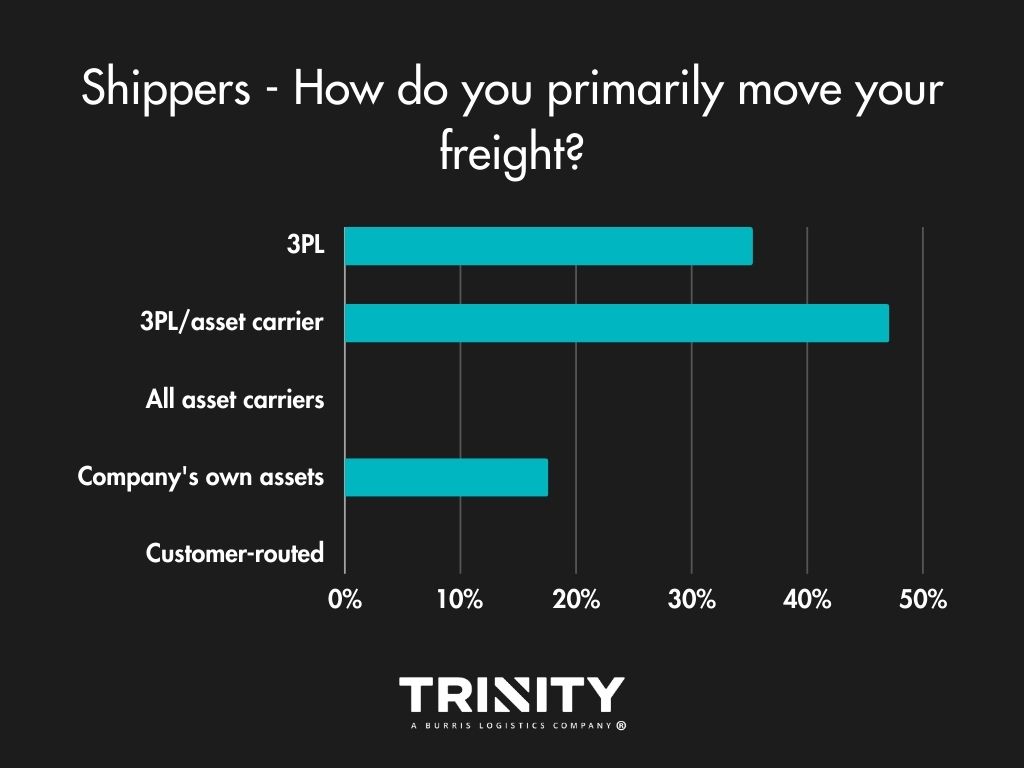
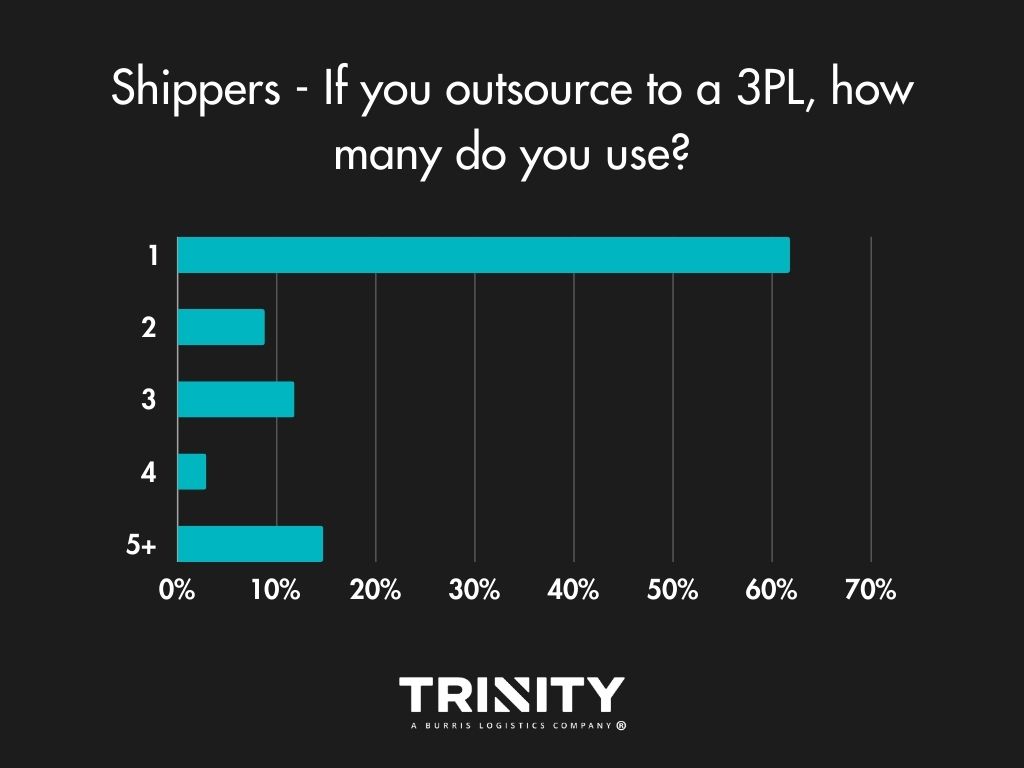
Shippers most often look to a 3PL for help with their everyday shipments, for transportation management, visibility, and access to their capacity. The main reason shippers choose not to work a 3PL for their logistics? They don’t like the risk.
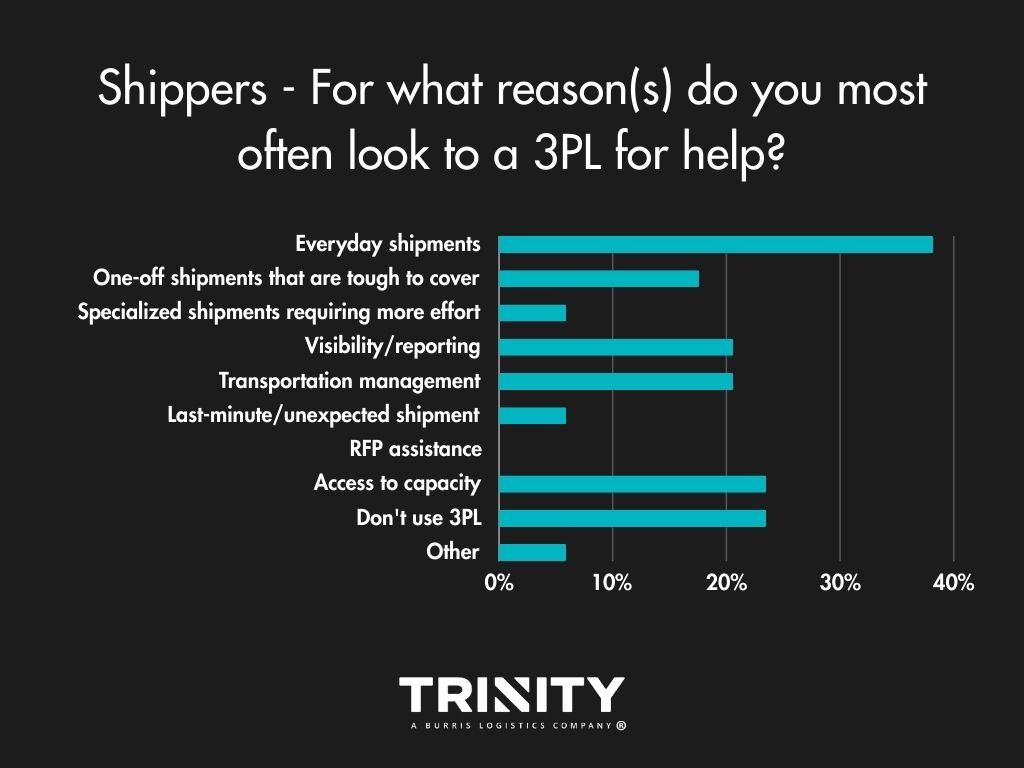
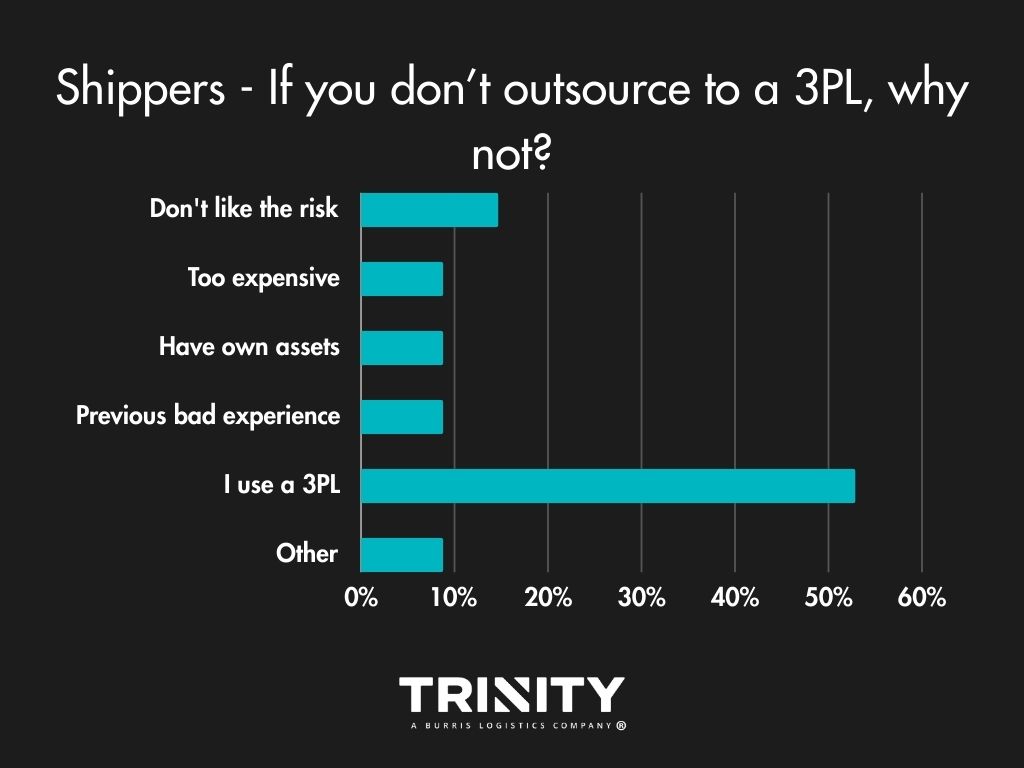
Transportation Modes – Staying Consistent
Overall, shippers aren’t looking to change what transportation modes they use for their shipments. Truckload and less-than-truckload (LTL) are the primary modes they like to use, with a little diversification sprinkled in.
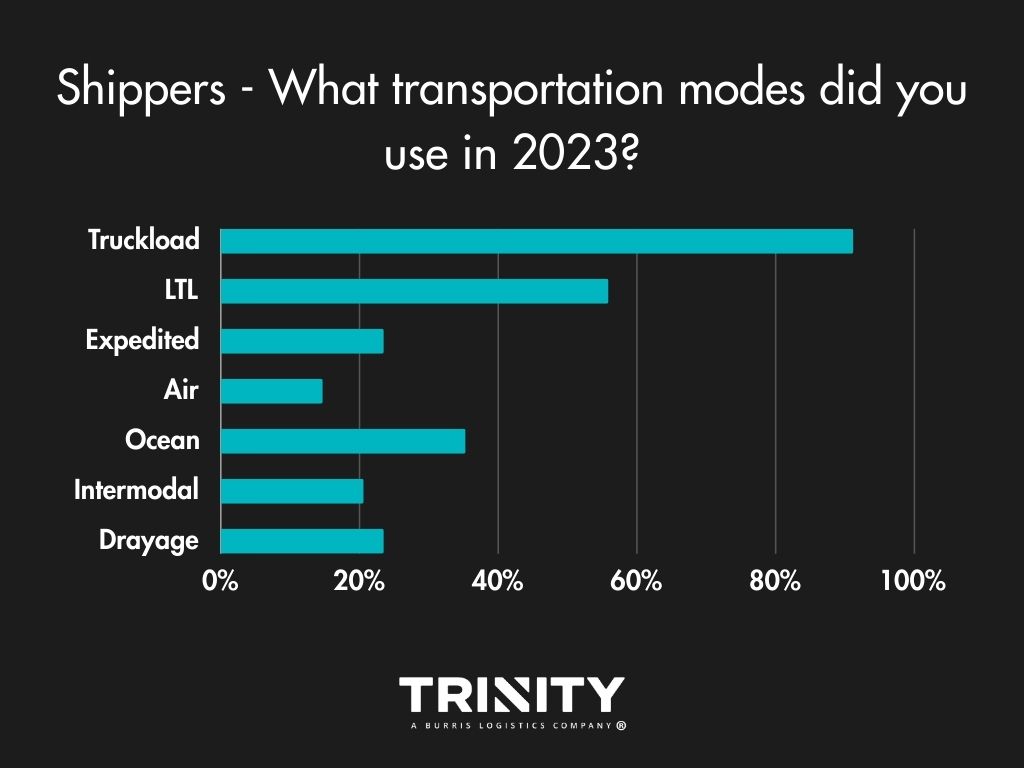
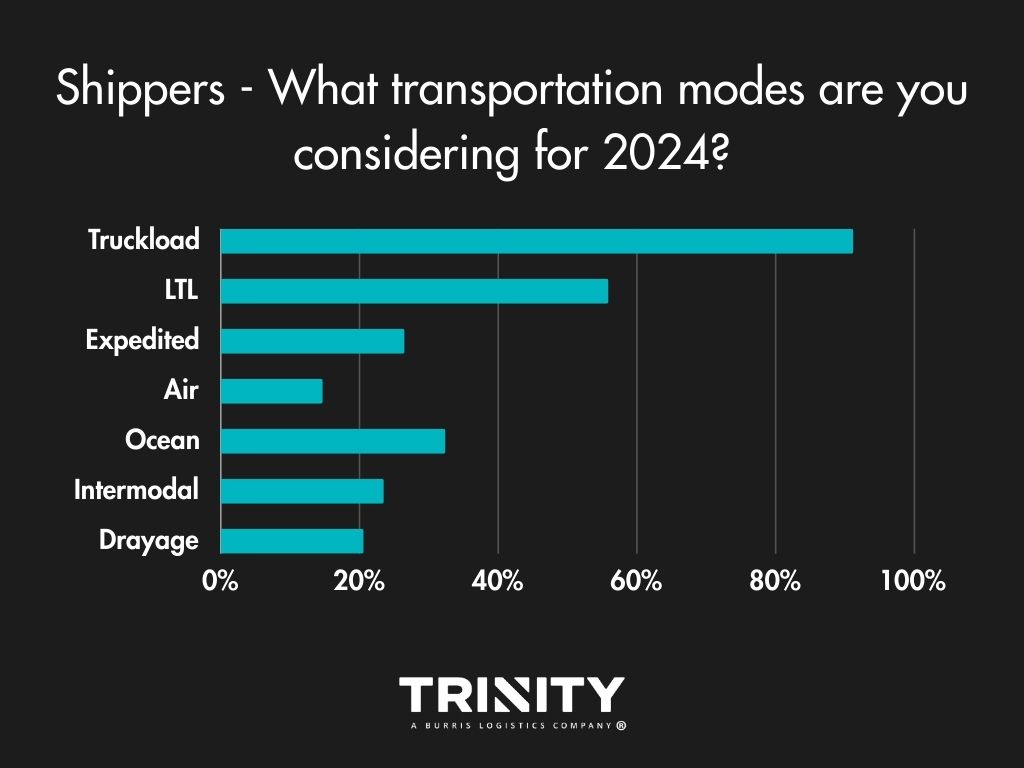
Exceptional Service Stands the Test of Time
When it comes to their logistics partners, shippers find the most value in receiving exceptional service, with costs coming in as a close second.
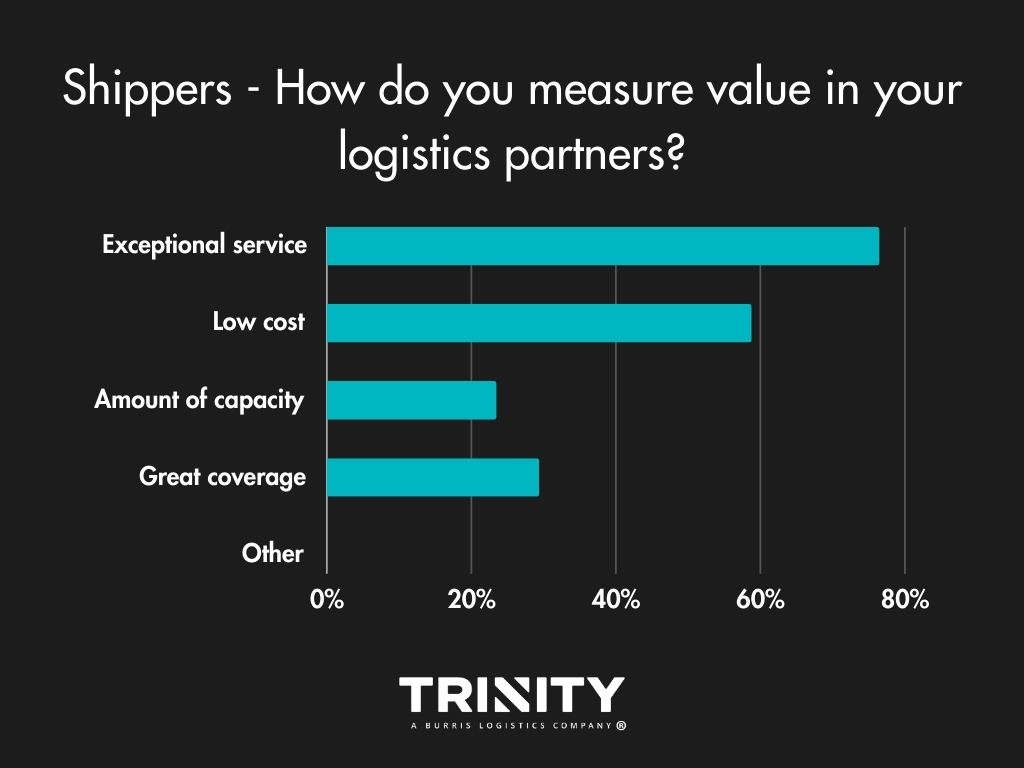
Most Wanted: Long Mileage, Flatbed Shipments
When it comes to mileage, most carrier companies tend to run long-hauls or a mix of short and long shipments. Flatbed hauls are the type of shipments most carriers like to haul with dry van coming in as a close second.
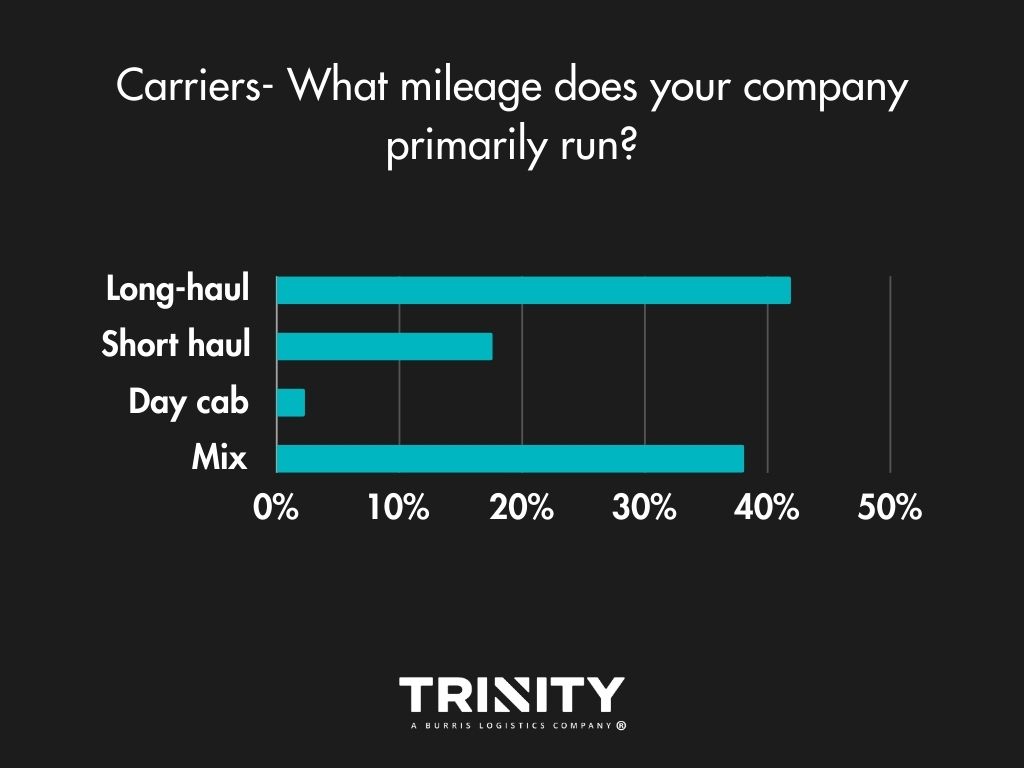
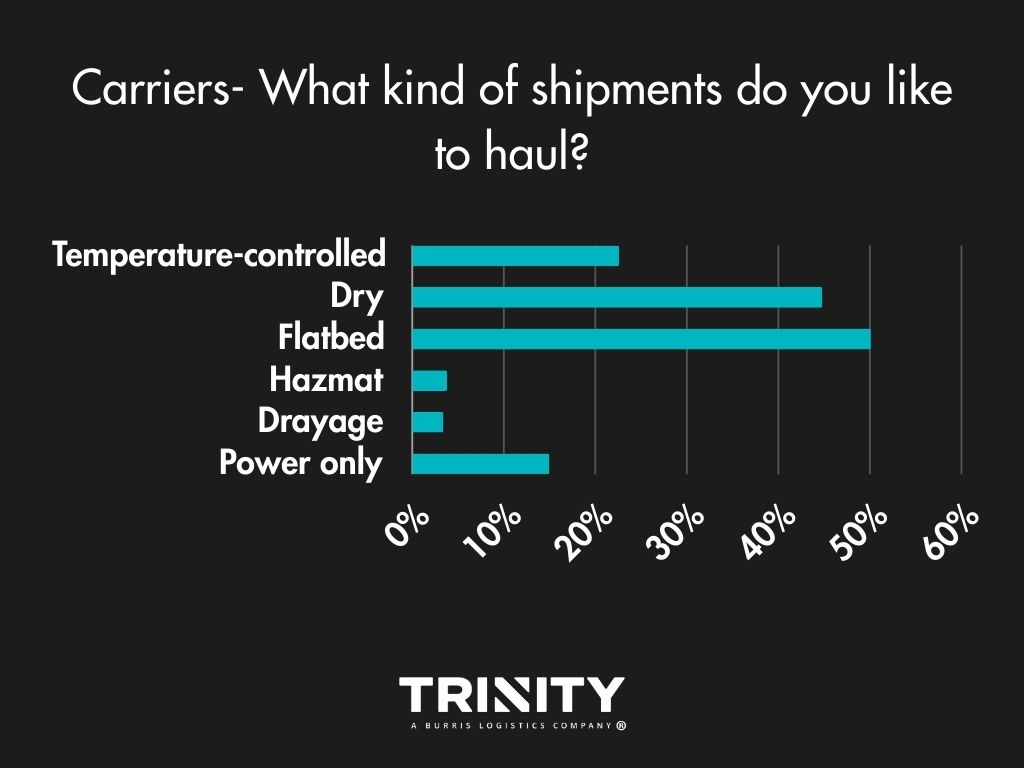
Load Boards are the Way
With 74 percent selecting this option, load boards are the norm for carriers to find available shipments. Sometimes they use their shipper relationships, and occasionally they make use of a 3PL.
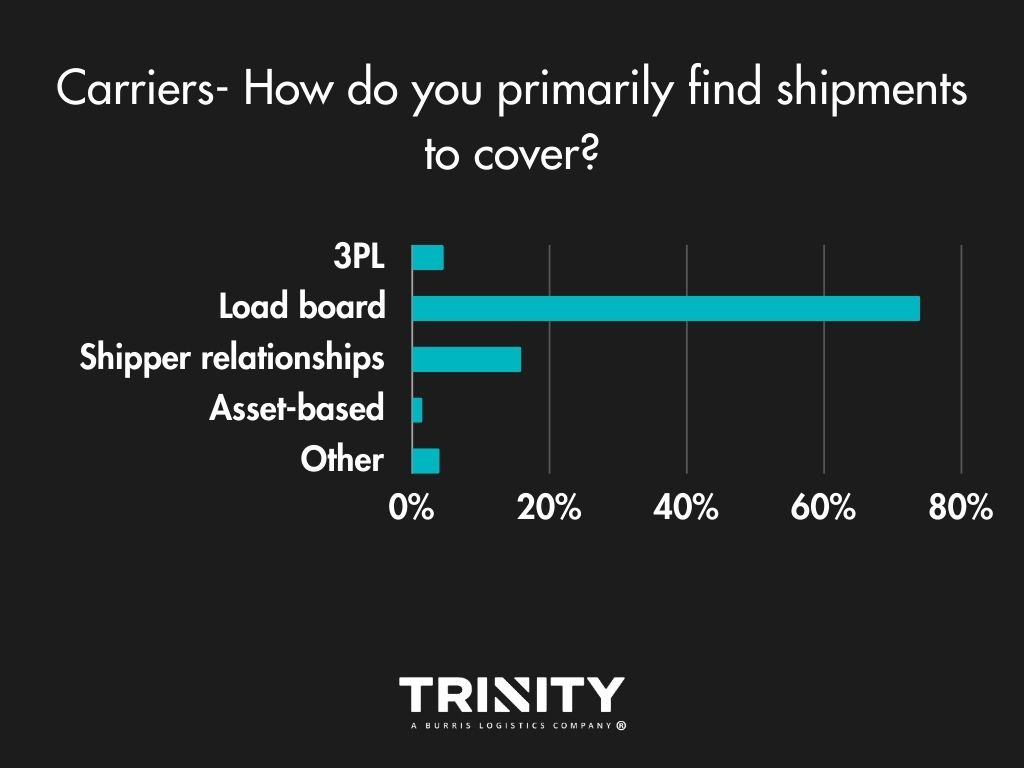
3PLs – Expanding a Carrier’s Reach
Carriers most often look to a 3PL for help with gaining access to available shipments that they wouldn’t have otherwise. Covering backhauls are another big reason carriers reach out to a 3PL.
For those that choose to not work with a 3PL, it’s often because of money; rates not being high enough. Surprisingly in the comments, many are not familiar with what a 3PL or freight broker is as well.
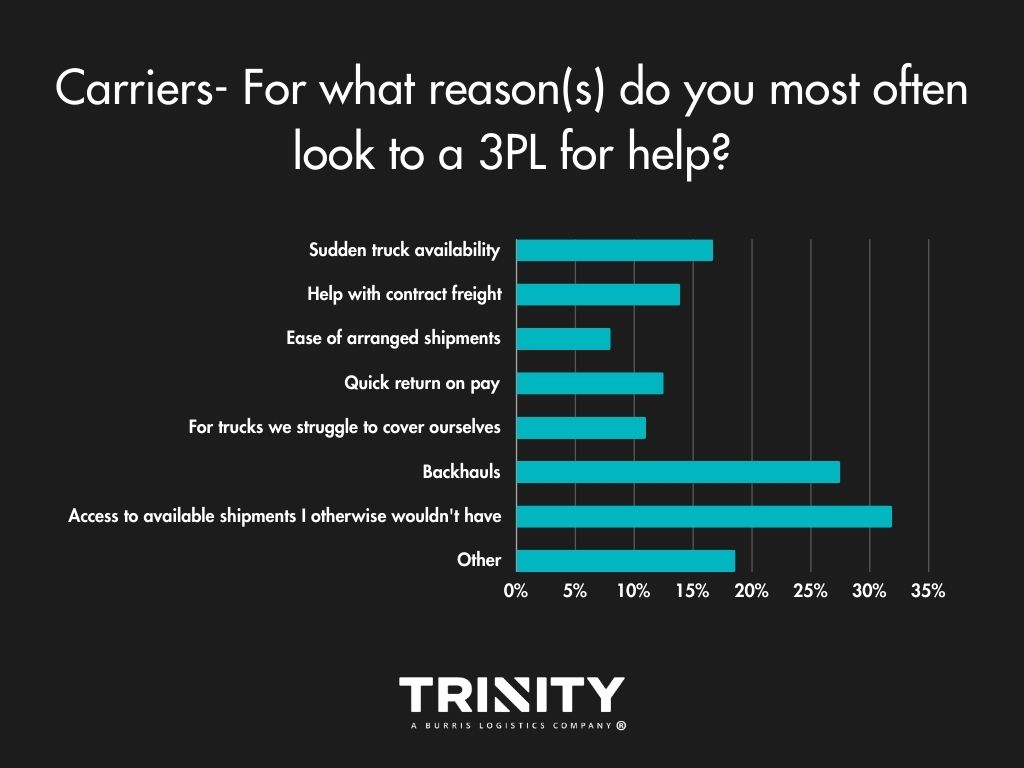
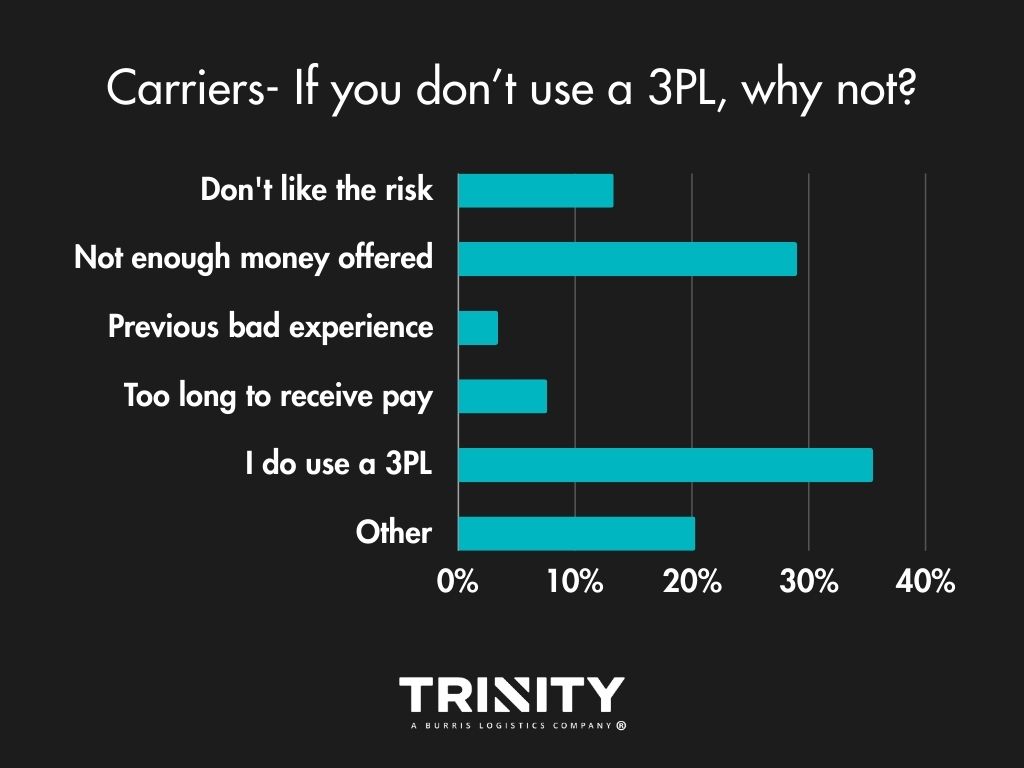
When it comes to measuring value in their 3PL partners, most carriers want good rates and great communication.
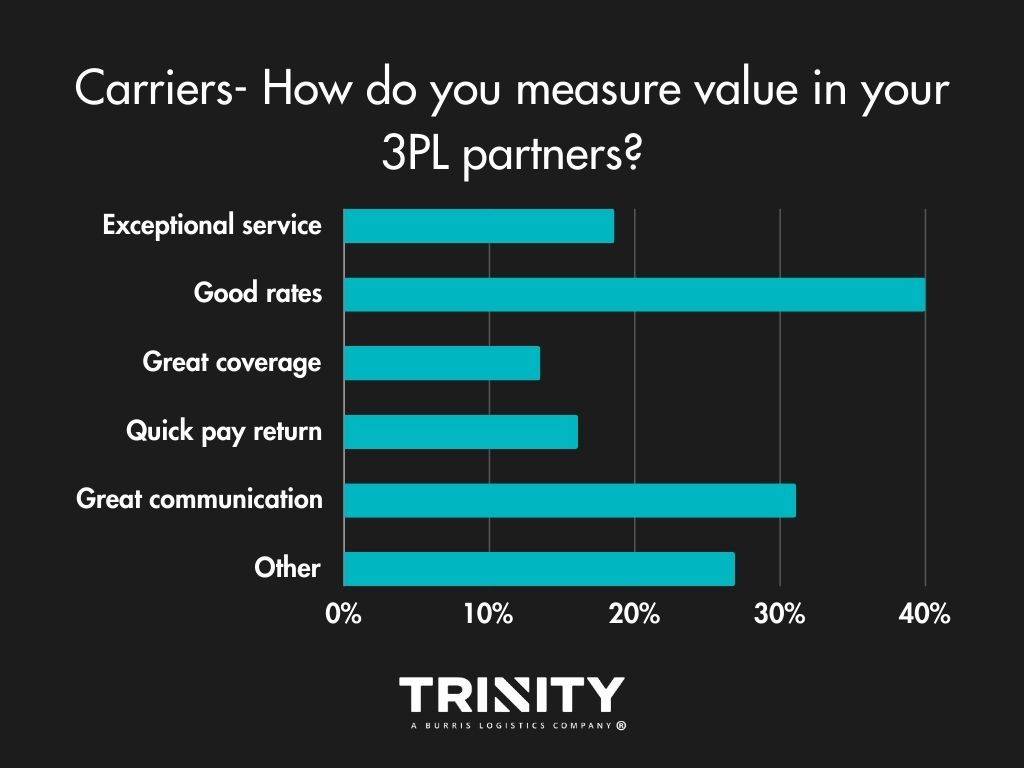
Fraud Concerns Growing
Fraud and scams have been growing in the industry, so we wanted to know what carriers think about it. Carriers are most worried about double and triple brokering affecting their businesses compared to concerns of identity theft or cargo theft.
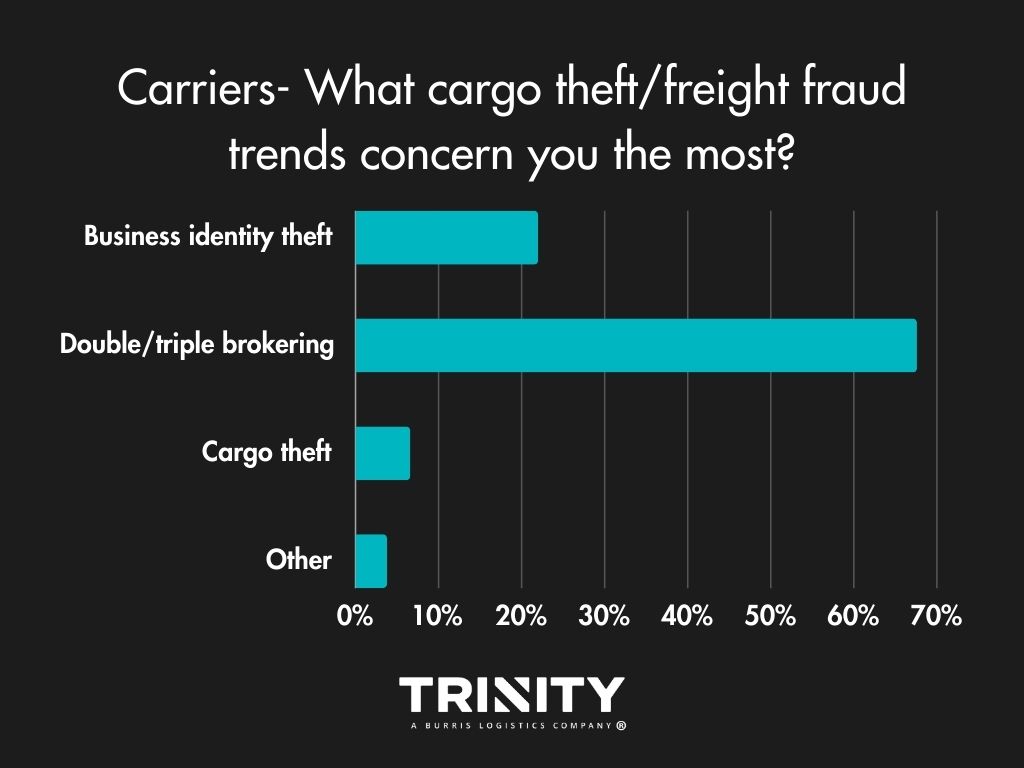
Successful goal-setting is a necessity for Freight Agents to run prosperous businesses. If you’re feeling stuck with your goal setting, the Fresh Start Effect could help you achieve what you want.
If you perform a web search on the “Fresh Start Effect”, you’ll find a lot of articles and studies on the impact that a Fresh Start Date has on goal setting.
What is a Fresh Start Date?
It’s a date that signifies a clear end and a new beginning. New Year’s Day is the epitome of a fresh start date because you’re ending one year and starting a new one. However, a Fresh Start Date doesn’t have to be as well known as New Year’s Day. It can be any day that signifies a new beginning such as your birthday, Mondays, the first day of a new month, etc.

Why Is a Fresh Start Date Important in Goal-Setting?
Studies show that people are more likely to commit to their goals when centered around a Fresh Start Date. It gives a boost to let go of the past, whether it’s a behavior that you would like to let go of or a new behavior that you would like to start.
Tips for Freight Agents to Achieve Their Goals
If you’re looking to really set yourself up for success when setting your goals, here are some tips you can put into place.
1. Set Your Fresh Start Date
Choose your Fresh Start date to give yourself an extra chance at committing to your goal!
2. Make It S.M.A.R.T.
Using this tried-and-true goal setting method can help you become specific in what you are trying to accomplish. Make sure your goals are specific, measurable, attainable, realistic, and timely, giving you a greater chance at seeing success.
3. Know Your Why
Make it personal. Why is this goal important to you? How will your life look different when it is accomplished? Goals that don’t have a personal why behind them can seem arbitrary and make it very easy to quit.
4. Write It Down and Share It!
Writing down your goal in a place that you can see often, such as a daily planner, helps keep you focused on the goal. Having someone else aware of your goal also helps you stay accountable to yourself!
5. Plan Ahead
This is the beauty of a Fresh Start Date. By knowing when you are going to start, you can put in the work ahead of time to close out your current chapter and begin the new one. Whether it’s transitioning and delegating responsibilities or researching and learning so that you can hit the ground running on your fresh start date, having some pre-planning time will allow you to focus on the goal ahead.
6. Celebrate!
Having a significant reward or way to signify the achievement of a goal can help maintain motivation. For example, one goal that many of Trinity’s Independent Freight Agents have each year is to achieve Platinum status. This is a designation set aside for Agents that hit production goals in a calendar year. The reward for our Platinum Agents is an all-expense paid vacation for two! It’s a great way to recognize success, celebrate, and network with other Platinum agents so that you can start getting motivated for the next year!
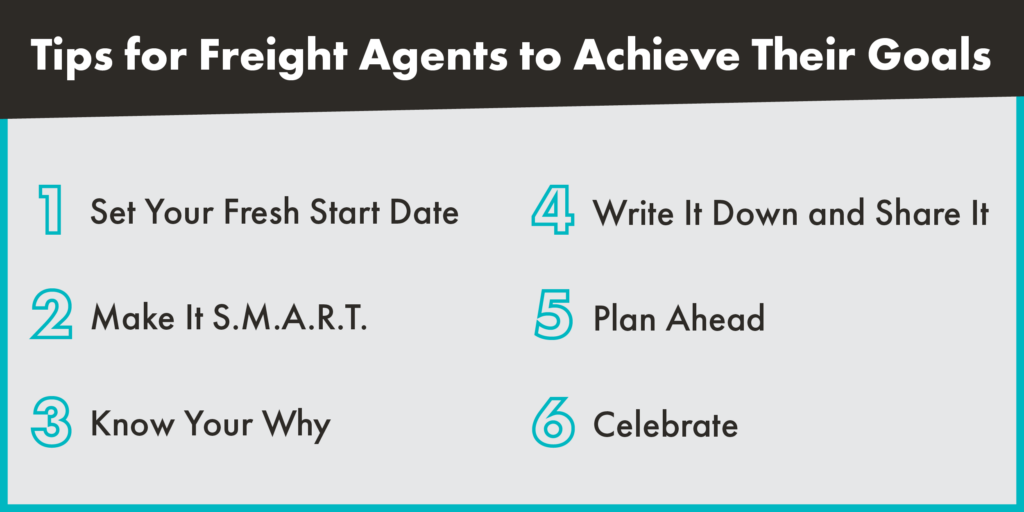
One thing many people forget is that goals don’t just have to be professional; they can be personal, too. Whether you want to strengthen your relationships or learn a new skill, use these tips to get yourself there.
How Trinity Helps Freight Agents Get a Fresh Start for Their Business
At Trinity, we plan our goals around our monthly periods. This gives us the opportunity to evaluate regularly to ensure that we are staying on track and adjust quickly if needed. With our Independent Freight Agents, we work with them based on their personal business needs. Depending on the particular goal of a Freight Agent office, we may review these monthly, quarterly, or annually.
For instance, many of our Agents set the goal to achieve Platinum Agent status. Because of this, we have a Platinum Agent tracking tool that we can send out at any time to help them track their progress toward this important goal.
A Fresh Start Date is just one tactic to setting your Freight Agent business up for success and always a great time to re-evaluate your current brokerage partner. In fact, Freight Agents who partner with Trinity Logistics often see an average of 20 percent growth within their first two years of joining.
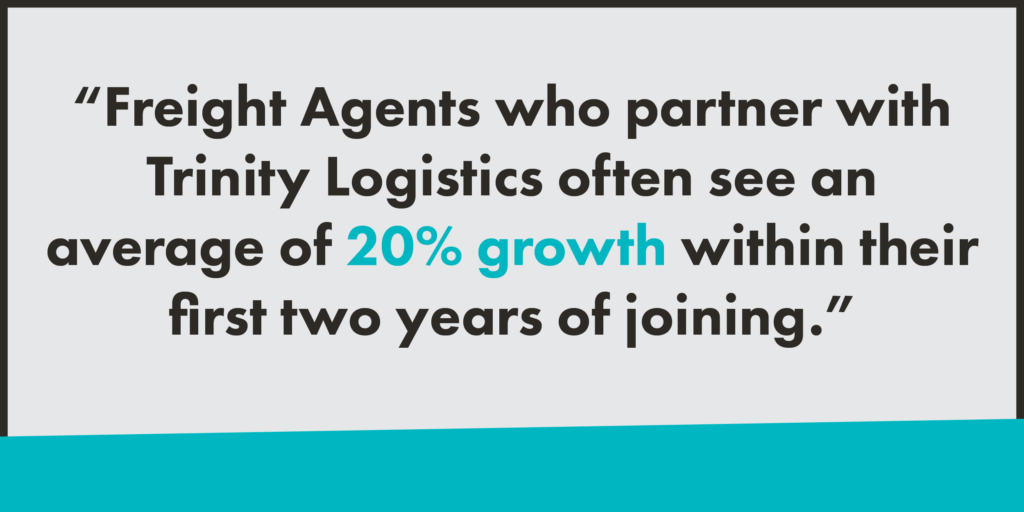
Check out the details of Trinity’s Freight Agent program to see if making a change at your next Fresh Start Date may be right for your business.
LEARN MORE ABOUT TRINITY’S FREIGHT AGENT PROGRAMStay up to date on the latest information on conditions impacting the freight market, curated by Trinity Logistics through our Freightwaves Sonar subscription.
COULD WE LOSE CARRIER CAPACITY….WITHOUT LOSING ACTUAL CAPACITY?
Certainly, this question could cause one to scratch his head. If we don’t have a decline in the number of operating authorities, or available trucks, then how could we lose capacity?
Well, technically, the answer is you would not be physically losing trucks. However, an impact could be felt from recent events with regards to container shipping that would make it feel like less trucks are available. With recent geo-political events, and events at home, shipping to the West Coast has become more feasible than it was a year, certainly two years, ago. As ocean carriers are mindful of events in the Red Sea, combined with an easing of labor tensions at the West Coast ports, freight that in prior years was diverted to the East Coast is now heading back to the left coast of our country.
As you can see in Figure 1.1, container costs from Asia to Los Angeles are over $1700 cheaper than freight bound for an East Coast port, such as New York. Figure 2.1 shows outbound freight volume for the last year in the Los Angeles market, currently seven percent higher than this time last year.
So how could this impact capacity? When freight hits the East Coast ports, it’s typically consumed close to the port or at the very least, the coast itself. This means more regional runs. When freight hits the West Coast, typically that freight is destined for locations such as Dallas, TX or Chicago, IL, so taking freight up and down the East Coast may be a one-day run. Freight out of the Los Angeles market, heading to further destinations would take a day and a half, two days.
Same freight, same one-truck move, but now it occupies that truck for twice as long. Additionally, this could necessitate a shifting of fleet resources from one coast to the other, potentially creating an over-capacity on one side of the U.S. while the other coast is more desperate for trucks.
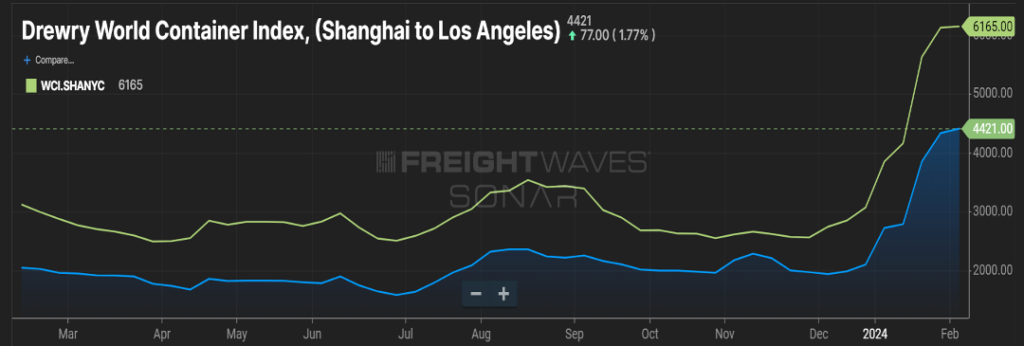
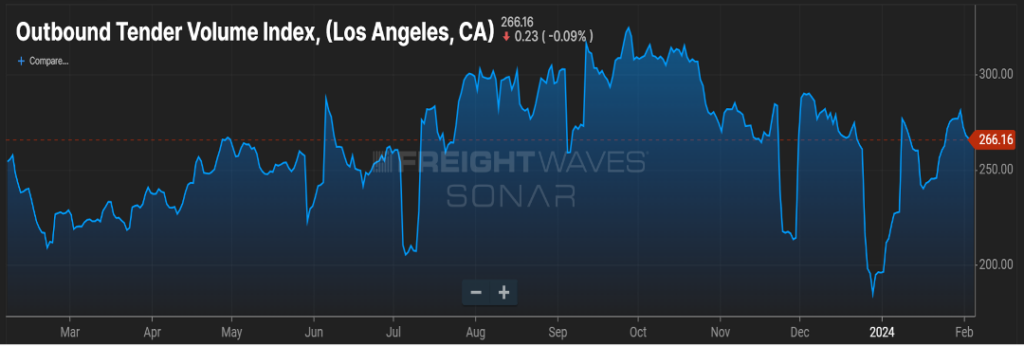
SPRING IN 6 WEEKS?
Will that rodent in Pennsylvania be right this year, and will freight volumes accelerate quicker as a result? First of all, ‘ol Punxsutawney Phil is batting less than 50 percent for his career and the last 10 years he’s only been accurate three times.
A better canary in the cave would be how the rejection rate index ebbs and flows. As you can see in Figure 3.1, van rejection rates have been pretty stagnant for the past year. Flatbed has remained relatively high and reefer rejection rates have trended up the last five months. If Phil is a soothsayer this year, we expect flatbed rejection rates to continue rising. If produce season also starts earlier than most, reefer rejection rates will then follow.
As reminder, with increases in rejection rates, shippers typically see transportation costs increase on the spot market.
Stay tuned for next month’s update to see if an early spring is a turning of the tide for the freight market.

Stay Up To dAte
Looking for a more frequent update? Subscribe to our newsletter and receive the top five logistics articles of the week every Friday morning by selecting “Weekly News Update” when you select your preferences.
Get Weekly News Updates in Your InboxTrinity Logistics, a leading logistics solutions provider, has been breaking bread with its customers through a series of exclusive roundtable events. These gatherings offer a unique platform for local customers to engage with Trinity’s Team Members, share insights, and strengthen collaborative relationships.
The first of these engaging events took place August 2023 in Dallas, Texas, at the acclaimed Pappas Bros Steakhouse, creating an inviting atmosphere for meaningful conversations. Following the success in Dallas, Trinity Logistics continued the momentum, hosting its second customer roundtable in November 2023 at the esteemed Steak 48 in Philadelphia.

The roundtable events go beyond the conventional business setting. Attendees, comprised of Trinity’s Team Members and their shipper relationships, participated in candid discussions about the current state of affairs, challenges faced by the individual companies, and their strategic focus for the future.
Deb Carrasquillo, a valued shipper relationship from Nichino America, attended the roundtable event in November and shared her thoughts on the unique experience. “The customer roundtable held by Trinity Logistics was a great opportunity to discuss logistical challenges facing businesses in our area outside of our industry. Sharing ideas, resolutions, and challenges amongst our group of supply and logistics professionals was a realization that our particular hurdles are consistent amongst other industries. We all depend on Trinity to assist us in achieving our respective corporate, supply, and customer goals. It was an excellent opportunity to meet and discuss with Trinity executives that we don’t normally interact with.”

Amanda Lloyd, Director of Sales Operations at Trinity Logistics, expressed the company’s commitment to fostering these connections. “Our customer relationships are at the heart of everything we do. These roundtable events are about more than talking logistics, but building long-lasting, successful business partnerships. We’re thrilled to have these opportunities to connect in person and gain valuable insights to how we can improve our services and solutions offered to shippers.”
Encouraged by the success of the initial events, Trinity Logistics is excited to host their next customer roundtable in Miami, Florida, scheduled for March. Invited attendees will have the exclusive opportunity to enjoy an evening filled with dining, engaging in conversations with Trinity Logistics Team Members and likewise industry professionals, while having the opportunity to shape the future of their logistics partnerships.
LEARN MORE ABOUT TRINITY LOGISTICSAbout Trinity Logistics
Trinity Logistics is a Burris Logistics Company, offering People-Centric Freight Solutions®. Our mission is to deliver creative logistics solutions through a mix of human ingenuity and innovative technology, enriching the lives of those we serve.
For the past 40 years, we’ve been arranging freight for businesses of all sizes in truckload, less-than-truckload (LTL), warehousing, intermodal, drayage, expedited, international, and technology solutions.
We are currently recognized on Transport Topics’ Top 100 Freight Brokerage List, as a Top 100 3PL by Inbound Logistics, and as a Top Company for Women to Work for in Transportation by Women in Trucking.
Craft Beer Logistics: Navigate Complexity, Grow Your Business
Beer, a beloved and timeless beverage. It’s a staple in many cultures and continues to be one of the world’s most popular drinks. A growing subset in beer is the craft beer industry, known for its robustness, variety of flavors, and highlighting regional tastes. According to the Brewers Association, in 2022, craft beer sales increased five percent and now account for almost a quarter of the U.S. beer market. While the demand for craft beer grows, the logistics behind its distribution is increasingly complex.
Craft brewery owners often wear many hats and have lots of tasks to hop on. This can include handling their logistics. This includes more than just the shipping of their beer but the many ingredients and equipment that go into making it. From start to finish, these beer supply chains involve numerous stages and stakeholders, including ingredient manufacturers, distributors, and retailers.
Having effective logistics planning and processes is crucial for craft brewers to meet their growing demand and provide great service to their stakeholders. Managing their supply chains can be difficult to do alone, which is why a third-party logistics (3PL) provider can be a valuable resource to growing craft breweries.
LOGISTICS CHALLENGES FACING THE CRAFT BEER INDUSTRY
Knowing how to legally and efficiently manage their shipping networks is a crucial part of running a successful craft brewery business. There are several challenges craft brewers face such as keeping temperature control throughout transportation, meeting state regulations, and meeting customer demand.
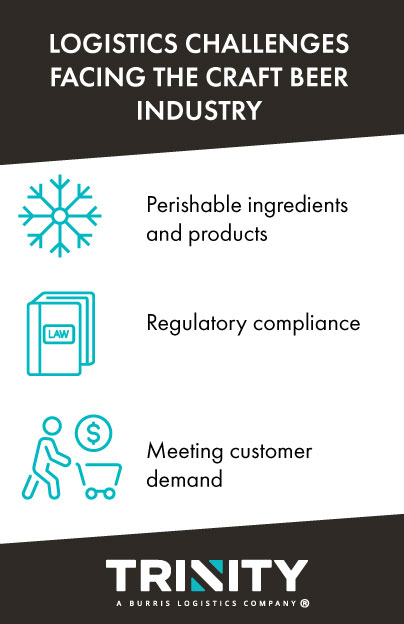
PERISHABLE INGREDIENTS AND PRODUCTS
The need for temperature control in the logistics of craft beer is paramount to preserve the integrity of any needed ingredients or finished products.
Craft brewers also often experiment with ciders, mead, and other malt beverages with specialized flavors, which can include perishable ingredients like fruit. The shelf life of the raw materials and craft beer brings along the element of urgency, placing even more importance on on-time deliveries. Coordinating these shipments to ensure quality beer adds an additional layer of complexity to the logistics process.
REGULATORY COMPLIANCE
Navigating the web of regulations for shipping beer in logistics can be a considerable challenge. Regulations for shipping alcohol vary from state to state, meaning you’ll need to be compliant based on where you are shipping to and from. Additionally, state laws will often change every few years, making it even more difficult.
Craft brewers must also find carriers with the correct licensing, knowledge, and experience to handle the unique requirements of transporting alcoholic beverages. It’s important to work with a logistics provider that knows all the ins and outs of meeting your product’s requirements and state regulations to prevent costly disruptions due to non-compliance.
MEETING CUSTOMER DEMAND
As craft brewers reach more customers, the more need there is for effective logistics planning. Having to juggle keeping track of supplies, determining the most efficient distribution methods, and preparing for any supply chain disruption can be overwhelming. Having a successful craft brewery goes beyond just brewing great beer, but ensuring it reaches the consumer when and where they want it.
Managing costs is on top of rolling out new beverages can be a significant challenge for craft breweries. Having efficient strategies, such as freight consolidation or finding the most cost-effective mode of transportation, can help keep costs in check. This is where an expert third-party logistics company (3PL) can assist with strategy and technology, like a transportation management system (TMS) for visible reporting.
3PL BENEFITS: BREWING SUCCESS WITH TRINITY LOGISTICS
While there may be difficulties to face in the dynamic world of craft brewing, partnering with a 3PL like Trinity Logistics can alleviate the burden. Here’s why working with us for your craft beer shipping and supply chain is the perfect recipe for success:
Our Only Job is Logistics
Logistics is what we handle day in and day out. When you trust us with your freight, you get more time to focus on what you do best – brewing exceptional beer and growing your business.
Experts in Specialized Shipments
Understanding the nuances of transporting freight with specialized requirements, such as temperature control, is our expertise. Whether it’s raw materials or the final product, we ensure everything arrives in optimal condition.
Regulation Compliance
Our dedicated Team and compliance department work diligently to ensure the necessary regulations are meant to provide you peace of mind and reduced risk.
Tracking and Tracing
We understand transparency is key to your success, so we offer several ways to view and keep track of your freight, no matter the time of day.
Effective Logistics Strategies
Whether you need help with something as simple as finding the most cost-effective mode of transportation to freight consolidation, we can help you find and implement strategies to optimize your supply chain and manage costs. It doesn’t matter if it’s just one or 20 pallets of freight, we can arrange full truckload, less-than-truckload (LTL), expedited, or any other mode you may need.
Reduced Risk
At Trinity, we meticulously verify all carrier relationships that we work with, not just during the initial setup but for every shipment. We’re also proud to share that less than one percent of all shipments coordinated with Trinity Logistics end up in a claim. If something does happen, we have a Cargo Claims Department at the ready to assist you in navigating any issues.
24/7/365 Support
No matter what happens, we’re ready to support you around the clock. We have a dedicated After-Hours Team to continue the monitoring of your freight and are ready to quickly resolve potential challenges, no matter the time of night, holidays, and every weekend.
Trustworthy Carrier Relationships
We treat and respect our carrier relationships just as much as our shipper ones. We aim to build a strong partnership with each one to help their businesses be successful. Because of that, we’ve built strong and trusted partnerships with those in our carrier network, providing you further confidence that your freight will arrive safely.
Managed Transportation
Whether you solely need a TMS for your transportation management, you’re looking for a fully outsourced solution, or something in between, we can help. We understand companies don’t come one-size-fits-all, and neither should the services you need to optimize your logistics. Our Managed Transportation services cater to businesses of all sizes and needs, capable of growing right alongside your brewing venture.
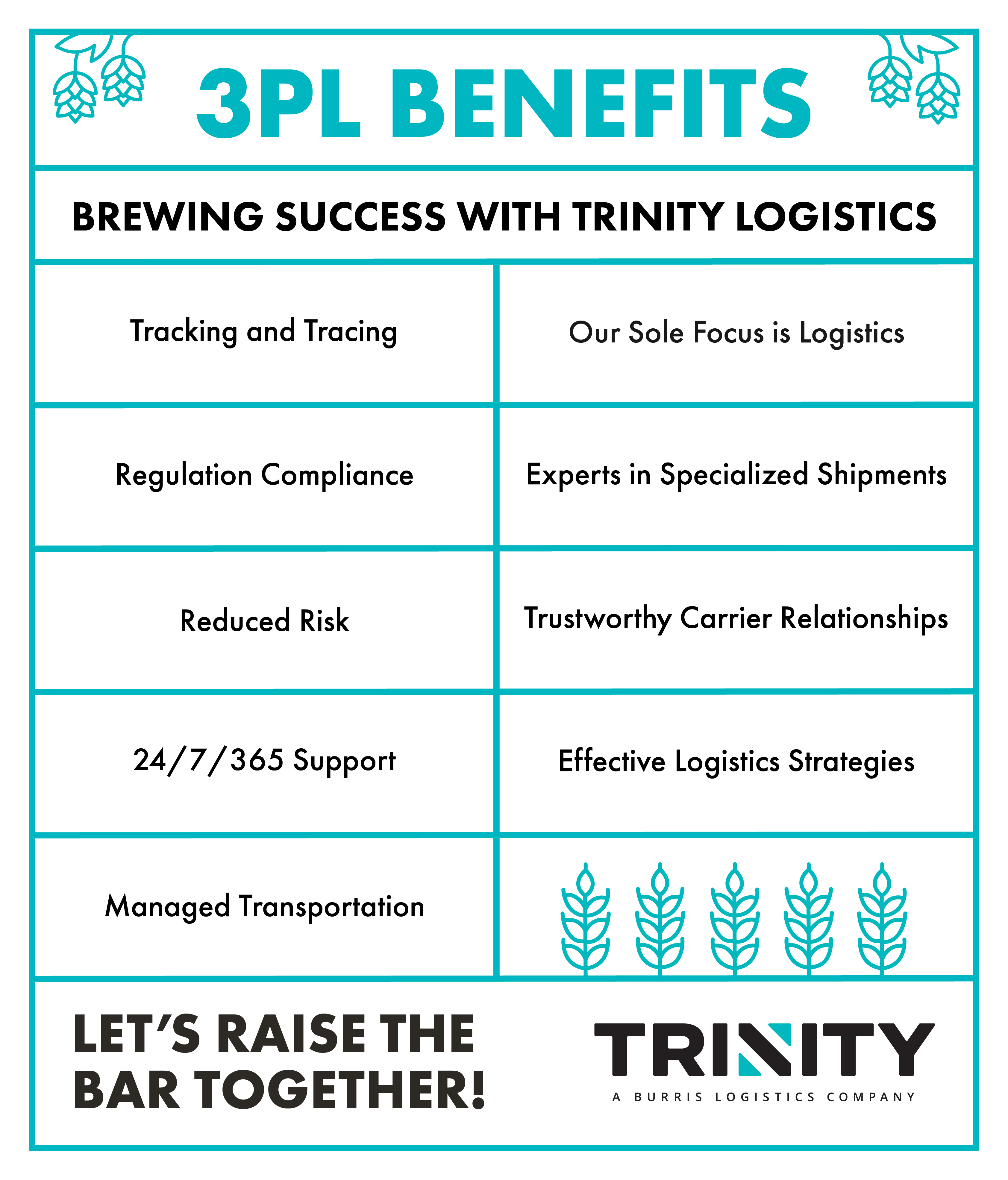
Partnering with Trinity Logistics offers you more than just transportation services. We’re a trusted, strategic ally that’s invested in seeing your business succeed. Leave the logistics to the seasoned experts, so you can focus on creatively and passionately brewing while we ensure your craft brews reach your consumers right when they want it.
LET US HELP WHAT ALES YOU IN LOGISTICSTrinity Logistics, a leading nationwide logistics provider, is pleased to announce the recent promotions of two key Team Members, Jake Lafferty and Dylan Banning, to Vice Presidents of their respective Regional Service Centers (RSCs).
Jake Lafferty, who joined Trinity Logistics in June of 2019, has been promoted to the Vice President of the Texas RSC. In his previous four years of dedicated service as the Director of Sales in Texas, Jake played a pivotal role in driving growth within that Team. His wealth of experience, strategic mindset, and deep understanding of the logistics industry makes him an excellent fit for this elevated leadership position.
“It’s been an exciting journey over the last four years leading the Texas Sales Team,” said Lafferty. “As I move into my new role, I’m excited to positively impact more people within the company. Trinity has given me and my family so much since I’ve joined. I view this new opportunity as a way to help preserve the culture and opportunities for other Team Members at Trinity, so they may have a similar experience as I did.”
Dylan Banning, a familiar face within the company, is taking on the role of Vice President at Trinity’s Minnesota RSC. Dylan’s journey with Trinity began in 2013 when he joined as an intern. Dylan’s strong dedication and impressive work ethic helped him climb the ranks, serving in various capacities, most recently as Director of Sales at the Delaware RSC, Trinity’s corporate location. Dylan’s proven leadership and commitment to Trinity, along with his familial ties to the Bannings, the original creators and owners of the company prior to 2019, showcases the legacy that still resides within Trinity’s culture today.
“I feel extremely honored and excited for the opportunity to work with and lead the Minnesota Regional Service Center,” said Banning. “I’m grateful for the five-plus years spent in the Delaware office, where I was surrounded by amazing Team Members and leaders who continuously promoted growth and opened doors to opportunities across the company. I look forward to getting started in Minnesota and can’t wait to see what the Team will accomplish in the future!”
“Jake has been a standout since his arrival to Trinity Logistics,” said Hayley Dobson, Senior Vice President of Trinity’s Regional Service Centers. “He’s been a major contributor in the development of our sales onboarding and training program, in addition to taking the Texas Team to benchmark performances. As for Dylan, he’s consistently demonstrated exceptional leadership, innovative thinking, and a strong work ethic. He has a proven track record in both operations and sales, as well as a passion for the industry and developing the Team around him. I believe both internal moves will make a positive impact on their respective Teams and the company as a whole.”
Trinity Logistics congratulates Jake and Dylan on their recent promotions. The company looks forward to the growth and success their new roles will bring.
Interested in working with an organization that is committed to you and your career growth?
Check out our open positionsAbout Trinity Logistics
Trinity Logistics is a Burris Logistics Company, offering People-Centric Freight Solutions®. Our mission is to deliver creative logistics solutions through a mix of human ingenuity and innovative technology, enriching the lives of those we serve.
For the past 40 years, we’ve been arranging freight for businesses of all sizes in truckload, less-than-truckload (LTL), warehousing, intermodal, drayage, expedited, international, and technology solutions.
We are currently recognized on Transport Topics’ Top 100 Freight Brokerage List, as a Top 100 3PL by Inbound Logistics, and as a Top Company for Women to Work for in Transportation by Women in Trucking.